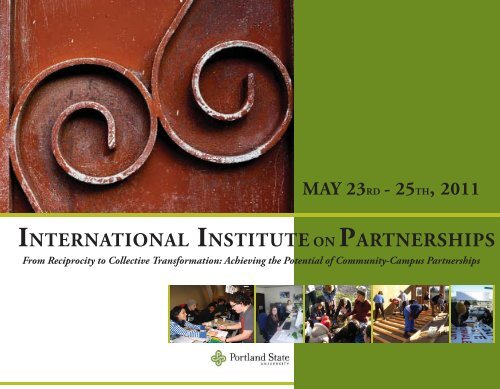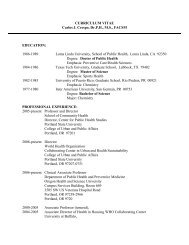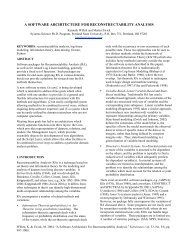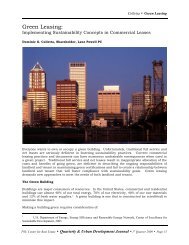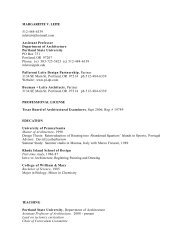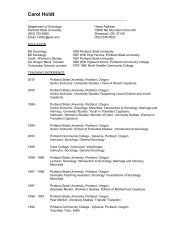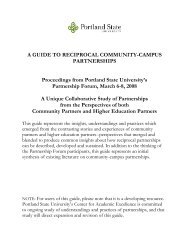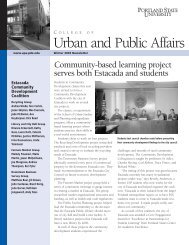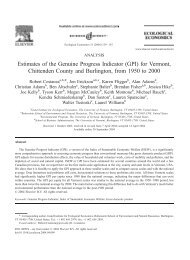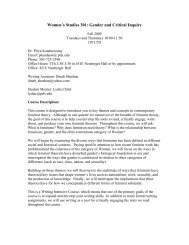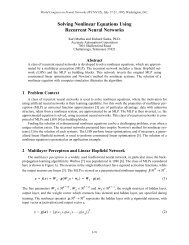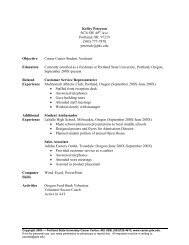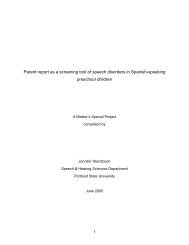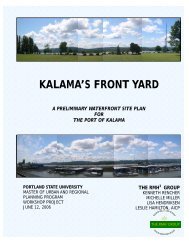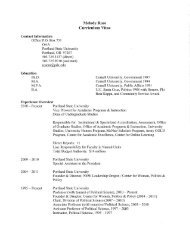international institute on partnerships - Portland State University
international institute on partnerships - Portland State University
international institute on partnerships - Portland State University
You also want an ePaper? Increase the reach of your titles
YUMPU automatically turns print PDFs into web optimized ePapers that Google loves.
MAY 23RD - 25TH, 2011<br />
INTERNATIONAL INSTITUTE ON PARTNERSHIPS<br />
From Reciprocity to Collective Transformati<strong>on</strong>: Achieving the Potential of Community-Campus Partnerships
WELCOME TO PORTLAND STATE UNIVERSITY!<br />
Dear Colleagues,<br />
• Host a Nati<strong>on</strong>al Partnership Forum (March, 2008);<br />
Welcome to <strong>Portland</strong> <strong>State</strong> <strong>University</strong>!<br />
<strong>Portland</strong> <strong>State</strong> <strong>University</strong>’s sec<strong>on</strong>d Internati<strong>on</strong>al Institute <strong>on</strong> Partnerships – 2011 is designed to support this important moment in the history<br />
of higher educati<strong>on</strong>. The debate about the importance of community-university <strong>partnerships</strong> is largely complete; the establishment of the<br />
Carnegie Foundati<strong>on</strong>’s Elective Classificati<strong>on</strong> for Community Engagement, al<strong>on</strong>g with the development of several important rubrics, articles,<br />
and books supported by important nati<strong>on</strong>al and <str<strong>on</strong>g>internati<strong>on</strong>al</str<strong>on</strong>g> organizati<strong>on</strong>s, is testament to the permanent role that community-engaged<br />
<strong>partnerships</strong> will play for colleges and universities worldwide as the 21st century progresses. Yet, as many of you know, there is a paucity of<br />
scholarship c<strong>on</strong>cerning community-campus <strong>partnerships</strong>. This Institute is the next step in <strong>Portland</strong> <strong>State</strong>’s intenti<strong>on</strong>al resp<strong>on</strong>se to address this<br />
important gap in our collective understanding. We are delighted you have chosen to join us; we count <strong>on</strong> you to help us c<strong>on</strong>tinue to expand<br />
and disseminate the scholarship of <strong>partnerships</strong>.<br />
Briefly, since early 2008, the Office of Academic Affairs has funded <strong>Portland</strong> <strong>State</strong>’s overall Partnership Initiative, designed and implemented<br />
by our Center for Academic Excellence (CAE). Working closely with CAE faculty and staff, Amy Driscoll has assisted us in our efforts to:<br />
• Produce an <strong>on</strong>line resource called the Guide for Reciprocal Partnerships - http://www.pdx.edu/sites/www.pdx.edu.cae/files/media_assets/Guide_corrected_041808.pdf (April, 2008);<br />
• Fund nine <strong>Portland</strong> <strong>State</strong> faculty/community partner research projects (May, 2008);<br />
• Develop an extensive partnership literature review (Available <strong>on</strong>-line at: (http://www.pdx.edu/sites/www.pdx.edu.cae/files/media_assets/LIT_REVIEW.pdf);<br />
• Undertake a campus-wide research project to investigate and disseminate promising partnership strategies (Phase I: May 2009);<br />
• Support 12 <strong>Portland</strong> <strong>State</strong> faculty researchers to each produce case studies of their community-engaged research <strong>partnerships</strong> (2010); and<br />
• Host the first and sec<strong>on</strong>d Internati<strong>on</strong>al Institute <strong>on</strong> Partnerships (May, 2009 and 2011)<br />
It is imperative that community engagement in higher educati<strong>on</strong> be further developed and sustained through reciprocal community-campus <strong>partnerships</strong>. We appreciate your Institute<br />
attendance and especially your c<strong>on</strong>tinued collaborati<strong>on</strong> with us in our efforts to help:<br />
• Disseminate the knowledge base and resources <strong>on</strong> partnership development<br />
• Provide models and mentors for instituti<strong>on</strong>s<br />
• Establish a research base <strong>on</strong> <strong>partnerships</strong><br />
• Guide scholars who wish to pursue the scholarship of <strong>partnerships</strong><br />
• Dem<strong>on</strong>strate curriculum for promoting partnership understandings and practices for faculty and students.<br />
Enjoy your time in <strong>Portland</strong>, and visit us again so<strong>on</strong>.<br />
Best regards,<br />
Roy W. Koch, Provost
The Internati<strong>on</strong>al Institute <strong>on</strong> Partnerships would not be possible without the support of our co-sp<strong>on</strong>sors:<br />
Associati<strong>on</strong> of American Colleges and Universities<br />
American Associati<strong>on</strong> of <strong>State</strong> Colleges and Universities<br />
Community-Campus Partnerships for Health<br />
Hands On Greater <strong>Portland</strong><br />
I Have a Dream Foundati<strong>on</strong>, Oreg<strong>on</strong><br />
Indiana <strong>University</strong>-Purdue <strong>University</strong> Indianapolis, Center for Service and Learning<br />
Internati<strong>on</strong>al Partnership for Service-learning and Leadership<br />
Lumina Foundati<strong>on</strong> for Educati<strong>on</strong><br />
Multicultural Center, <strong>Portland</strong> <strong>State</strong> <strong>University</strong><br />
New England Resource Center for Higher Educati<strong>on</strong><br />
Oreg<strong>on</strong> Campus Compact<br />
PHC Ventures<br />
Talloires Network<br />
United Way of the Columbia-Willamette<br />
<strong>University</strong> North Carolina Greensboro<br />
Multicultural Center<br />
The Talloires<br />
Network<br />
PHC Ventures<br />
Patti Clayt<strong>on</strong>
NATIONAL ADVISORY BOARD<br />
The wisdom and experience of this diverse group has shaped<br />
our thinking and guided <strong>Portland</strong> <strong>State</strong> <strong>University</strong>’s Partnership<br />
Initiative activities.<br />
The Center for Academic Excellence (CAE) is a<br />
source of leadership and innovati<strong>on</strong> for <strong>Portland</strong><br />
<strong>State</strong> <strong>University</strong> communities. The CAE is dedicated<br />
to excellence in teaching, learning, assessment,<br />
research, and community-university <strong>partnerships</strong>.<br />
Maria Avila, Occidental College<br />
Bob Bringle, IUPUI: Center for Service and<br />
Learning<br />
Celestina Castillo, Occidental College<br />
David Cox, <strong>University</strong> of Memphis<br />
Jessica Denning, <strong>Portland</strong> <strong>State</strong> <strong>University</strong><br />
Cathy Doyle, Paul S. Sarbanes, Center for<br />
Public and Community Service<br />
Amy Driscoll, Carnegie Foundati<strong>on</strong><br />
Nikki Falbo, <strong>Portland</strong> <strong>State</strong> <strong>University</strong><br />
Bob Franco, Kapiolani Community College<br />
Elmer R. Freeman, Center for Community<br />
Health Educati<strong>on</strong> Research and Service, Inc.<br />
Zoë Freeman, Pike Market Senior Center<br />
Julie Hatcher, IUPUI: Center for Service and<br />
Learning<br />
Kevin Kecskes, <strong>Portland</strong> <strong>State</strong> <strong>University</strong><br />
Seanna Kerrigan, <strong>Portland</strong> <strong>State</strong> <strong>University</strong><br />
Dick Kinsley, Ohio Campus Compact<br />
Roy Koch, <strong>Portland</strong> <strong>State</strong> <strong>University</strong><br />
Mark Langseth, I Have A Dream Foundati<strong>on</strong><br />
Eric Mankowski, <strong>Portland</strong> <strong>State</strong> <strong>University</strong><br />
Leslie McBride, <strong>Portland</strong> <strong>State</strong> <strong>University</strong><br />
George Mehaffy, American Associati<strong>on</strong> of <strong>State</strong><br />
Colleges and Universities<br />
Barry Messer, <strong>Portland</strong> <strong>State</strong> <strong>University</strong><br />
Carol Morgaine, <strong>Portland</strong> <strong>State</strong> <strong>University</strong><br />
Jenna Padbury, St. Francis Dining Hall<br />
George Pernsteiner, Oreg<strong>on</strong> <strong>University</strong> System<br />
Michael Reard<strong>on</strong> , <strong>Portland</strong> <strong>State</strong> <strong>University</strong><br />
Andrew Reed, SE Works, Inc.<br />
Vicki Reitenauer, <strong>Portland</strong> <strong>State</strong> <strong>University</strong><br />
Leslie Rennie-Hill<br />
Gene Rice, Antioch <strong>University</strong><br />
Shawn Smallman, <strong>Portland</strong> <strong>State</strong> <strong>University</strong><br />
Amy Spring, <strong>Portland</strong> <strong>State</strong> <strong>University</strong><br />
Joshua Todd, Multnomah County Commissi<strong>on</strong> <strong>on</strong><br />
Children, Families & Community<br />
Dilafruz Williams, <strong>Portland</strong> <strong>State</strong> <strong>University</strong><br />
David Wu, US Representative<br />
Visit us <strong>on</strong>-line at www.pdx.edu/cae<br />
Without the tireless work of students and staff in the<br />
CAE, this event would not have been possible. Special<br />
thanks to the Institute Planning Committee:<br />
Jaime Becker<br />
Amy Driscoll<br />
Emily Gilliland<br />
Anya Hankin<br />
Emily Hoffer<br />
Kevin Kecskes<br />
Esther Lim<br />
Patrice Morris Huds<strong>on</strong><br />
IIP has engaged a variety of social networking approaches to support our work<br />
together. Join us in our efforts to cultivate interactive, <strong>on</strong>-line c<strong>on</strong>versati<strong>on</strong>s<br />
about Institute learnings, reflecti<strong>on</strong>s, and emerging questi<strong>on</strong>s.<br />
Post your comments and IIP photos at facebook.com/pdxIIP during and after<br />
the Institute. *You do NOT need a facebook account to post <strong>on</strong> the site!<br />
Katie Shaw<br />
Amy Spring<br />
CAE staff and students
INTERNATIONAL INSTITUTE ON PARTNERSHIPS<br />
SW CLAY<br />
SW BROADWAY<br />
SW 6TH AVE<br />
HOTEL<br />
MODERA<br />
SW 5TH AVE<br />
SW COLUMBIA<br />
SW CLAY<br />
SW MARKET<br />
SW 4TH<br />
From Reciprocity to Collective<br />
Transformati<strong>on</strong>: Achieving the Potential<br />
of Community-Campus Partnerships<br />
MAY 23-25, 2011<br />
PARKING<br />
STRUCTURE III<br />
SIMON<br />
BENSON<br />
HOUSE<br />
SW PARK AVENUE<br />
SW MILL<br />
CRAMER<br />
HALL<br />
SW MONTGOMERY<br />
SMITH<br />
MEMORIAL<br />
UNION<br />
SW BROADWAY<br />
PARKING<br />
STRUCTURE II<br />
PARKING<br />
STRUCTURE I<br />
EAST<br />
HALL<br />
SW MILL<br />
SW HARRISON<br />
SW HALL<br />
ASRC<br />
SW MONTGOMERY<br />
SW 4TH AVE<br />
Building Locati<strong>on</strong>s:<br />
Smith Memorial Student Uni<strong>on</strong> - 1825 SW Broadway<br />
Sim<strong>on</strong> Bens<strong>on</strong> House - 1803 SW Park Avenue<br />
Cramer Hall - 1721 SW Broadway<br />
East Hall - 632 SW Hall<br />
Academic Student Recreati<strong>on</strong> Center<br />
(ASRC) - 1812 SW 6th Avenue<br />
SW COLLEGE<br />
SW JACKSON<br />
SW LINCOLN<br />
UNIVERSITY<br />
PLACE<br />
HOTEL<br />
With any questi<strong>on</strong>s or c<strong>on</strong>cerns during the Institute, please c<strong>on</strong>tact Patrice Morris Huds<strong>on</strong>, Program Administrator at 503.725.5642 or<br />
patrice.cae@pdx.edu. With urgent logistical c<strong>on</strong>cerns up<strong>on</strong> arrival, c<strong>on</strong>tact Amy Spring, Assistant Director, Community-<strong>University</strong><br />
Partnerships, <strong>on</strong> her cell, 503.866.5452.
MONDAY, MAY 23rd - WELCOME & NETWORKING SOCIAL<br />
The IIP team welcomes you to the 2011 Institute in typical <strong>Portland</strong> fashi<strong>on</strong>—with great c<strong>on</strong>versati<strong>on</strong> and scrumptious eats! Get acquainted with this vibrant<br />
city by experiencing our distinctive <strong>Portland</strong> food scene. While enjoying delicious Peruvian tapas; sampling the diversity of food cart delicacies; eating fresh<br />
seafood al<strong>on</strong>g the river; or sipping local ale; c<strong>on</strong>nect with IIP participants and mingle with key presenters and facilitators in small, participant-centered<br />
dinner groups. Over drinks and dinner we will engage in some facilitated casual c<strong>on</strong>versati<strong>on</strong> and activities that will help guide our time together throughout<br />
the Institute. Each group will be hosted by a local community-campus partner who will arrange transportati<strong>on</strong> for their group— we will reach our dining<br />
destinati<strong>on</strong>s via cab, streetcar, <strong>on</strong> foot, or pedicab. Your group host will c<strong>on</strong>tact you with specific details. See you there!<br />
1) Andina Restaurant: A Taste of Peru in the Pearl $$-$$$ www.andinarestaurant.com | 1314 NW Glisan<br />
2) Clarklewis: Farm to Table $$-$$$ www.clarklewispdx.com | 1001 SE Water Avenue # 160<br />
3) Deschutes Brewery & Public House: Local ale $-$$ www.deschutesbrewery.com | 210 NW 11th Avenue<br />
4) East India Co. Grill & Bar: Indian $-$$$ www.eastindiacopdx.com | 821 SW 11th Avenue<br />
5) Food Carts: Unique <strong>Portland</strong> Cuisine $ www.foodcartsportland.com<br />
6) Higgins Restaurant and Bar: Northwest Regi<strong>on</strong>al Cuisine $$-$$$ higgins.ypguides.net | 1239 SW Broadway<br />
7) McCormick & Schmick’s Harborside at the Marina $-$$$ www.mccormickandschmicks.com | 0309 SW M<strong>on</strong>tgomery<br />
8) Silk: Vietnamese Restaurant and Bar $-$$ www.phovanrestaurant.com/silk| 1012 NW Glisan<br />
9) Southpark: Seafood Grill & Wine Bar $$ http://southparkseafood.com | 901 SW Salm<strong>on</strong><br />
10) Urban Farmer: Sustainable Steakhouse $-$$$ www.urbanfarmerrestaurant.com | 525 SW Morris<strong>on</strong>, Nines Hotel<br />
Multicultural Center<br />
The Talloires<br />
Network<br />
PHC Ventures<br />
Patti Clayt<strong>on</strong><br />
6
WELCOME, REFLECTIONS, AND FRAMING FOR PARTICIPATION TUESDAY, MAY 24th<br />
7:30 to 8:00 a.m. in Ballroom 355 REGISTRATION<br />
8:00 to 9:45 a.m. in Ballroom 355 BREAKFAST: WELCOME AND REFLECTIONS ON PARTNERSHIPS - President Wim Wiewel, <strong>Portland</strong> <strong>State</strong> <strong>University</strong><br />
CHALLENGE TO PARTICIPANTS OF THE INTERNATIONAL INSTITUTE ON PARTNERSHIPS -<br />
Kevin Kecskes, Associate Vice Provost for Engagement, <strong>Portland</strong> <strong>State</strong> <strong>University</strong><br />
REFLECTION AND PREPARATION FOR THE DECONSTRUCTION SESSION -<br />
Amy Driscoll, Senior Scholar, <strong>Portland</strong> <strong>State</strong> <strong>University</strong><br />
10:00 a.m. to 12:00 no<strong>on</strong> DECONSTRUCTING TRANSFORMATIVE PARTNERSHIPS<br />
Dynamic partner teams will share accomplishments, challenges, strategies, and issues in resp<strong>on</strong>se to audience probing, analyzing, and<br />
interpretati<strong>on</strong>. Facilitators will assist in the elaborati<strong>on</strong> and examinati<strong>on</strong> of the c<strong>on</strong>cepts of reciprocity and transformati<strong>on</strong> in the c<strong>on</strong>text of actual <strong>partnerships</strong>.<br />
The interacti<strong>on</strong>s are directed to extending understandings of the kind of philosophy, approaches, and “day-to-day” communicati<strong>on</strong> that promote transformati<strong>on</strong>.<br />
Facilitators will also guide the synthesis of what is dec<strong>on</strong>structed into a set of recommendati<strong>on</strong>s for initiating, developing, and sustaining reciprocal and<br />
transformative <strong>partnerships</strong>. Select <strong>on</strong>e of the three sessi<strong>on</strong>s outlined below.<br />
Smith 228<br />
South Memphis Revitalizati<strong>on</strong> Acti<strong>on</strong> Project,<br />
Memphis, Tennessee<br />
The South Memphis Revitalizati<strong>on</strong> Project is a residentled<br />
neighborhood effort involving local residents,<br />
community leaders, elected officials from South<br />
Memphis, and a growing number of <strong>University</strong> of<br />
Memphis students and faculty. The project, initiated<br />
by St. Andrew American Methodist Episcopal Church,<br />
involved more than 1,000 residents in the development<br />
of a comprehensive revitalizati<strong>on</strong> plan that was adopted<br />
by the Memphis City Council in March 2010. During the<br />
past year, the revitalizati<strong>on</strong> has achieved significant<br />
infrastructure, funding, and several community projects.<br />
Team Partners include: Karen McGee, Steering<br />
Committee Member, South Memphis Revitalizati<strong>on</strong><br />
Acti<strong>on</strong> Project; Kathryn Lambert Penningt<strong>on</strong>, Asst.<br />
Professor, Department of Anthropology, <strong>University</strong> of<br />
Memphis; Kenneth M. Reard<strong>on</strong>, Professor, City and<br />
Regi<strong>on</strong>al Planning Department, <strong>University</strong> of Memphis;<br />
and Curtis Thomas, Executive Director, The Works,<br />
Inc.<br />
Facilitators: Johnell Bell, Multnomah County<br />
Representative for U. S. Senator Jeff Merkley; Patti<br />
Clayt<strong>on</strong>, C<strong>on</strong>sultant with PHC Ventures, Senior Scholar<br />
Indiana <strong>University</strong>, Purdue <strong>University</strong>, Indianapolis<br />
*This sessi<strong>on</strong> is facilitated in collaborati<strong>on</strong> with IUPUI<br />
Center for Service and Learning, and UNC Greensboro<br />
Smith 333<br />
The Chinatown Renewal Project,<br />
Salinas, California<br />
The Chinatown Renewal Project is a comprehensive<br />
community-based revitalizati<strong>on</strong> effort in the historically<br />
rich, though currently ec<strong>on</strong>omically blighted, Chinatown<br />
neighborhood of Salinas, California. Working with the<br />
Chinese C<strong>on</strong>fucius Church, the Japanese Buddhist<br />
temple, the Filipino-American Cultural Center, the<br />
Salinas Redevelopment Agency, and the agencies<br />
providing services to homeless in the neighborhood,<br />
CSU M<strong>on</strong>terey Bay has collaborated with energy, visi<strong>on</strong>,<br />
and resources to support this dynamic process of<br />
community revitalizati<strong>on</strong>. The <strong>University</strong> has become an<br />
integral part of the re-birth of Salinas’ Chinatown with<br />
the involvement of 762 service learning students and<br />
more than 20 faculty and staff.<br />
Team Partners include: Larry Hirahara, Past President<br />
of the Salinas Buddhist Temple; Seth Pollack, Professor<br />
of Service Learning and Director of the Service Learning<br />
Institute, CSU M<strong>on</strong>terey Bay; D<strong>on</strong> Reynolds, Salinas<br />
Redevelopment Agency; M<strong>on</strong>ique Rutland, Visual and<br />
Public Arts Student CSU M<strong>on</strong>terey Bay; and Rick Sl<strong>on</strong>e,<br />
Missi<strong>on</strong> Director, Franciscan Workers of Junipero Serra.<br />
Facilitators: Maria Avila, Director of Community-based<br />
Learning, Occidental College; Rey España, Director<br />
– Community Development, Native American Youth &<br />
Family Center, <strong>Portland</strong><br />
Smith 327/8<br />
Community Watershed Stewardship<br />
Program, <strong>Portland</strong>, Oreg<strong>on</strong><br />
The Community Watershed Stewardship Program (CWSP)<br />
is a joint venture of the City of <strong>Portland</strong> Bureau of<br />
Envir<strong>on</strong>mental Services and <strong>Portland</strong> <strong>State</strong> <strong>University</strong>.<br />
The partnership began in 1994, and since that time,<br />
has provided an essential mechanism for the partners<br />
to focus <strong>on</strong> furthering their primary instituti<strong>on</strong>al roles<br />
as well as <strong>on</strong> a mutual intent with innovative efforts to<br />
increase community capacity. Ultimately those efforts<br />
have worked to improve the quality of water in <strong>Portland</strong>’s<br />
watersheds and to provide a platform for educati<strong>on</strong> and<br />
research by students and faculty to address important<br />
community challenges, c<strong>on</strong>sistent with PSU’s missi<strong>on</strong> to<br />
“let knowledge serve the city.” The CWSP has funded and<br />
worked with over 100 partners in diverse communities<br />
throughout the city of <strong>Portland</strong>. In 2009, CWSP was<br />
recognized as the first awardee of the Jimmy and Rosalyn<br />
Carter Nati<strong>on</strong>al Partnership Award for Campus community<br />
Collaborati<strong>on</strong>.<br />
Team Partners include: Jennifer Devlin, Watershed<br />
Programs Manager, The Community Watershed<br />
Stewardship Partnership, Barry Messer, Professor of<br />
Urban and Urban Affairs, <strong>Portland</strong> <strong>State</strong> <strong>University</strong>;<br />
Garrett Phillips, Graduate Student, <strong>Portland</strong> <strong>State</strong><br />
<strong>University</strong>, and Bridger Wineman, Community Liais<strong>on</strong>.<br />
Facilitators: Matt Hartley, Associate Professor<br />
and Chair, Higher Educati<strong>on</strong> Studies, <strong>University</strong> of<br />
Pennsylvania; Sarena Seifer, Executive Director,<br />
Community-Campus Partnerships for Health<br />
7
TUESDAY, MAY 24th<br />
12 no<strong>on</strong> to 1:00 p.m. in Ballroom 355 LUNCH - Display/Discussi<strong>on</strong> of Insights from Partnership Dec<strong>on</strong>structi<strong>on</strong> Sessi<strong>on</strong><br />
1:15 p.m. to 2:45 p.m. TOPICAL PARTNERSHIP WORKSHOPS - Select <strong>on</strong>e of the three sessi<strong>on</strong>s outlined below.<br />
Smith 327/8<br />
Research <strong>on</strong> Partnerships: Insights from<br />
Collaborati<strong>on</strong> with Philanthropy<br />
An innovati<strong>on</strong> in community engagement is the<br />
creati<strong>on</strong> of meaningful <strong>partnerships</strong> between<br />
practiti<strong>on</strong>ers, administrators, educators,<br />
government leaders, and local philanthropic<br />
organizati<strong>on</strong>s. This sessi<strong>on</strong> summarizes<br />
insights about <strong>partnerships</strong> based <strong>on</strong> a nati<strong>on</strong>al<br />
dem<strong>on</strong>strati<strong>on</strong> program. Fifty local <strong>partnerships</strong><br />
involving over 200 funders and more than<br />
450 community partners have been created to<br />
develop local soluti<strong>on</strong>s to a comm<strong>on</strong> problem. The<br />
partnership processes and experiences have been<br />
rigorously studied and evaluated through multiple<br />
methods. Less<strong>on</strong>s about establishing effective<br />
<strong>partnerships</strong> will be shared.<br />
Presenters: Thomas Aschenbrener, President,<br />
Northwest Health Foundati<strong>on</strong><br />
Sherril B. Gelm<strong>on</strong>, Professor of Public Health<br />
and Chair of the Divisi<strong>on</strong> of Public Administrati<strong>on</strong>,<br />
Hatfield School of Government, <strong>Portland</strong> <strong>State</strong><br />
<strong>University</strong><br />
Judith Woodruff, Program Director, Health<br />
Workforce, Northwest Health Foundati<strong>on</strong><br />
2:45 p.m. to 3:00 p.m. BREAK<br />
Smith 333<br />
Building Capacity for Reciprocal<br />
Partnerships: Identities, Roles,<br />
Competencies, and Growth of All<br />
Partners as Co-Educators, Co-Learners<br />
and Co-Generators of Knowledge<br />
Reciprocity in <strong>partnerships</strong> includes not <strong>on</strong>ly mutual<br />
benefit but also a power shift and co-creati<strong>on</strong>. All<br />
partners share resp<strong>on</strong>sibility for and have a voice in<br />
designing, implementing, and assessing the work of<br />
the partnership. In this sessi<strong>on</strong>, we will explore the<br />
ways in which it is counter-normative for students,<br />
community members, and faculty/staff to embody<br />
and enact co-roles, while examining associated<br />
challenges and opportunities. Participants<br />
will leave the sessi<strong>on</strong> with c<strong>on</strong>crete ideas for<br />
professi<strong>on</strong>al development activities that target all<br />
partners.<br />
Presenters: Patti Clayt<strong>on</strong>, C<strong>on</strong>sultant with PHC<br />
Ventures; Senior Scholar at Indiana <strong>University</strong><br />
Purdue <strong>University</strong> at Indianapolis<br />
Kathleen Edwards, Graduate Student, <strong>University</strong><br />
of North Carolina at Greensboro<br />
Brand<strong>on</strong> Whitney, Co-founder and Director of<br />
Operati<strong>on</strong>s in Our Backyard (ioby), Greensboro,<br />
North Carolina<br />
Smith 236<br />
Racial Disparities Unmasked: Opportunities,<br />
Struggles, and Impacts in Partnered Research<br />
Imagine university researchers working closely with a powerful,<br />
local Communities of Color Coaliti<strong>on</strong> to attempt to document the<br />
state of racial inequities in a major urban setting. Now imagine<br />
what might occur when multiple voices interact throughout the<br />
major stages of research. This effort began in 2008, and c<strong>on</strong>tinues.<br />
The complexities and impacts of this partnership will be shared.<br />
A reflective case study of this work is part of larger instituti<strong>on</strong>al<br />
network of community-engaged scholars at <strong>Portland</strong> <strong>State</strong><br />
<strong>University</strong>. The process and emerging insights of this network<br />
will frame the discussi<strong>on</strong>. We will share how <strong>Portland</strong> <strong>State</strong> has<br />
instituti<strong>on</strong>ally supported partnered research such as this important<br />
work.<br />
Presenters: Ann Curry-Stevens, Associate Professor, School of<br />
Social Work, <strong>Portland</strong> <strong>State</strong> <strong>University</strong><br />
Cynthia Gomez, Community Partner: Program Director, Civic<br />
Engagement and Leadership Programs, Latino Network<br />
Kevin Kecskes, Associate Vice Provost for Engagement, <strong>Portland</strong><br />
<strong>State</strong> <strong>University</strong><br />
Valerie Palmer, Senior Research Associate, Global Health<br />
Center, OHSU; and President, Immigrant and Refugee Community<br />
Organizati<strong>on</strong><br />
Katie Shaw, Graduate Student, <strong>Portland</strong> <strong>State</strong> <strong>University</strong><br />
8
TUESDAY, MAY 24th<br />
3:00 p.m. to 4:30 p.m. INTERACTIVE WORKSHOPS FACILITATED BY COMMUNITY/HIGHER EDUCATION PARTNERS<br />
Select <strong>on</strong>e of the eight sessi<strong>on</strong>s outlined below (c<strong>on</strong>tinued next page).<br />
Smith 333<br />
Smith 294<br />
Smith 329<br />
Smith 328<br />
Building Capacity for Partnership<br />
Assessment and Improvement: A<br />
Visual Approach<br />
The CBR Fellows Program:<br />
Enhancing Student and<br />
Community Outcomes<br />
Student Leaders Strengthening<br />
Community Partnerships and<br />
Enhancing Student Learning<br />
Social Solidarity and the<br />
Assessment of <strong>University</strong>-<br />
Community Partnerships in<br />
Internati<strong>on</strong>al Settings<br />
Building the capacity of individuals<br />
to critically evaluate the quality of<br />
relati<strong>on</strong>ships embedded in collaborative<br />
projects is vital to improving outcomes<br />
for those involved in and affected by<br />
partnership activities. Drawing from<br />
research focused <strong>on</strong> expanding the<br />
c<strong>on</strong>ceptual model of <strong>partnerships</strong> and<br />
measuring attributes of partnership<br />
relati<strong>on</strong>ships, this sessi<strong>on</strong> will engage<br />
participants in an interactive reflecti<strong>on</strong><br />
activity in which individuals graphically<br />
model relati<strong>on</strong>ships c<strong>on</strong>tributing to a<br />
given collaborati<strong>on</strong>. The resulting graphic<br />
model will reveal implicit assumpti<strong>on</strong>s,<br />
untapped or underdeveloped resources,<br />
and asymmetries of communicati<strong>on</strong><br />
between and am<strong>on</strong>g individuals/groups.<br />
To date, this method has been used with<br />
faculty engaged in improving service<br />
learning <strong>partnerships</strong>; however it can<br />
be used with any c<strong>on</strong>stituency. Sessi<strong>on</strong><br />
facilitators will also present strategies<br />
for using this method across multiple<br />
stakeholders, for program evaluati<strong>on</strong>,<br />
and/or research purposes.<br />
With funding from a Nati<strong>on</strong>al CBR<br />
Networking Initiative Innovati<strong>on</strong><br />
Subgrant, Bates College’s Harward Center<br />
for Community Partnerships created<br />
a co-curricular CBR Fellows Program<br />
that empowers students to learn with<br />
and across boundaries of discipline and<br />
purpose; community, student, staff,<br />
and faculty partners collaborate <strong>on</strong><br />
projects of appropriate scale that meet<br />
community needs, creating CBR that is<br />
more empowering and resp<strong>on</strong>sive than<br />
many course-based models. Nearly<br />
all Fellows projects grow out of l<strong>on</strong>gterm<br />
engagement with their community<br />
partners, so mutual trust grounds their<br />
collaborati<strong>on</strong>. And as the model works<br />
with small teams, community partners<br />
are vital co-teachers whose c<strong>on</strong>cerns are<br />
co-equal. The program uses at least three<br />
of the “Five High-Impact Practices” from<br />
AACU’s 2010 publicati<strong>on</strong>, offering a new<br />
model for rigorous CBR with significant<br />
community voice and impact. Community<br />
partners have expressed interest in their<br />
own parallel Fellows program in the<br />
future.<br />
Service-learning is designed to be<br />
beneficial to community organizati<strong>on</strong>s,<br />
but with many experiencing budget<br />
cuts and staff layoffs, organizati<strong>on</strong>s<br />
have less time to oversee servicelearners.<br />
<strong>University</strong> of San Francisco<br />
assists community organizati<strong>on</strong>s to<br />
coordinate service-learning through the<br />
Advocates for Community Engagement<br />
(ACE) program, which places student<br />
leaders <strong>on</strong>-site at organizati<strong>on</strong>s.<br />
ACEs functi<strong>on</strong> as student and faculty<br />
recruiters, liais<strong>on</strong>s, project managers,<br />
logistical administrators, and reflecti<strong>on</strong><br />
leaders to enhance service-learning<br />
experiences and strengthen relati<strong>on</strong>ships<br />
am<strong>on</strong>g stakeholders. As peer leaders,<br />
ACEs provide resources, guidance, and<br />
reflecti<strong>on</strong> to deepen student learning. In<br />
this sessi<strong>on</strong>, a community partner, ACE,<br />
and service-learning administrator will<br />
discuss the ACE goals and outcomes,<br />
training curriculum, and practical<br />
applicati<strong>on</strong>. Participants will brainstorm,<br />
discuss, and plan a similar student<br />
leadership program/role for their own<br />
use.<br />
Creating and sustaining <str<strong>on</strong>g>internati<strong>on</strong>al</str<strong>on</strong>g><br />
“<strong>partnerships</strong>” pose unique challenges.<br />
Based <strong>on</strong> the Dutch sociologist, Aafke<br />
Komter, Social Solidarity and the Gift<br />
(2005), the presenters offer a social<br />
solidarity rubric to assess progress<br />
towards transformative <strong>partnerships</strong> in<br />
<str<strong>on</strong>g>internati<strong>on</strong>al</str<strong>on</strong>g> settings. Using such a tool<br />
can assist partners to assess progress<br />
towards a robust relati<strong>on</strong>ship by clarifying<br />
operati<strong>on</strong>al assumpti<strong>on</strong>s and making<br />
benefits explicit. The purpose of the social<br />
solidarity rubric is to provide a framework<br />
to assist US based higher educati<strong>on</strong><br />
instituti<strong>on</strong>s in instituti<strong>on</strong>alizati<strong>on</strong><br />
<strong>partnerships</strong> in <str<strong>on</strong>g>internati<strong>on</strong>al</str<strong>on</strong>g> communitybased<br />
settings, by focusing <strong>on</strong> latent<br />
factors like trust, power, sustainability,<br />
and reciprocity. Participants may find this<br />
discussi<strong>on</strong> and rubric useful in framing<br />
critical issues related to <str<strong>on</strong>g>internati<strong>on</strong>al</str<strong>on</strong>g><br />
university-community <strong>partnerships</strong>, or<br />
as part of a c<strong>on</strong>tinuous improvement<br />
planning for emerging and developed<br />
<strong>partnerships</strong> in <str<strong>on</strong>g>internati<strong>on</strong>al</str<strong>on</strong>g> c<strong>on</strong>texts.<br />
Presenters: Mary F. Price, Service<br />
Learning Specialist, Office of Service &<br />
Learning, IUPUI Center for Service &<br />
Learning<br />
Starla Officer, Coordinator, Office of<br />
Neighborhood Partnerships, IUPUI Center<br />
for S&L<br />
Presenter: Anna Sims Bartel,<br />
Independent Scholar/C<strong>on</strong>sultant; Former<br />
Director, Harward Center for Community<br />
<strong>partnerships</strong>, Bates College<br />
Georgia Nigro, Interim Director,<br />
Harward Center for Community<br />
<strong>partnerships</strong>, Bates College<br />
Presenters: Andrea Wise, Coordinator of<br />
Community-based Learning, <strong>University</strong> of<br />
San Francisco<br />
Hilary Douglas, Volunteer Coordinator,<br />
Project Open Hand, USF<br />
Jasmine Giblin, Advocate for Community<br />
Engagement, McCarthy Center, USF<br />
Presenters: Mark Falbo, Director, Center<br />
for Community-based Learning, <strong>University</strong><br />
of No. Florida<br />
Heather Burk, Assistant Director, Center<br />
for Community-based Learning, UNF<br />
Joseph Cist<strong>on</strong>e, Executive Director and<br />
CEO, Internati<strong>on</strong>al Partners in Missi<strong>on</strong><br />
Jean Ann Sekerak, Managing Director,<br />
Internati<strong>on</strong>al Partners in Missi<strong>on</strong><br />
9
TUESDAY, MAY 24th<br />
3:00 p.m. to 4:30 p.m. INTERACTIVE WORKSHOPS FACILITATED BY COMMUNITY/HIGHER EDUCATION PARTNERS (c<strong>on</strong>tinued from page 9)<br />
Smith 327<br />
Smith 298<br />
Smith 236<br />
Smith 296<br />
Five Points of Partnership:<br />
A Campus and Community<br />
Partnership Approach to Building<br />
Healthier Communities<br />
The Five Points of Partnership<br />
workshop will prepare participants<br />
to effectively participate in creating<br />
healthier communities and overcoming<br />
complex societal problems that require<br />
collaborative soluti<strong>on</strong>s. Participants will<br />
discuss what makes healthy communities,<br />
examine the decline in civic participati<strong>on</strong>,<br />
define individual roles in active<br />
citizenship, engage in a five-step process<br />
of developing effective <strong>partnerships</strong>,<br />
discuss opportunities for incorporating<br />
engaged teaching, research and service<br />
into partnership activities, and process<br />
next steps and opportunities to engage<br />
respective campuses and communities<br />
in partnership endeavors. Five Points<br />
of Partnership and WKU’s Campus &<br />
Community Network provide replicable<br />
opportunities for engaged scholarship<br />
activities such as service-learning and<br />
community-based research. This sessi<strong>on</strong><br />
will provide steps in developing an applied<br />
learning experience aimed at building<br />
capacity for democratic engagement.<br />
Presenters: Leah Ashwill, Director,<br />
ALIVE Center for Community Partnerships,<br />
Western Kentucky <strong>University</strong><br />
Terry Shoemaker, Program Coordinator,<br />
WKU Institute for Citizenship &<br />
Resp<strong>on</strong>sibility<br />
Courte Voorhees, Assistant Professor,<br />
WKU Institute for Citizenship & Social<br />
Resp<strong>on</strong>sibility<br />
The Battle between “Helping”<br />
and “Serving”: Creating Learning<br />
Envir<strong>on</strong>ments that Model<br />
Reciprocity<br />
Utilizing Rachel Remen’s “Helping, Fixing<br />
or Serving” paradigm this interactive and<br />
reflective presentati<strong>on</strong> will facilitate a<br />
discussi<strong>on</strong> <strong>on</strong> how to promote meaningful<br />
learning and service outcomes while<br />
forging reciprocal campus-community<br />
<strong>partnerships</strong>. With the assumpti<strong>on</strong> that<br />
community engaged <strong>partnerships</strong> must<br />
challenge students’ noti<strong>on</strong>s of helping<br />
and fixing to prepare them to emerge as<br />
leaders for social change, the sessi<strong>on</strong> will<br />
explore the roles of faculty, supporting<br />
staff and community partners in creating<br />
a learning envir<strong>on</strong>ment that fosters<br />
equality and reciprocity in relati<strong>on</strong>ships,<br />
instills the desire to move bey<strong>on</strong>d quickfixes<br />
into understanding the root causes<br />
of social issues, and encourages c<strong>on</strong>tinued<br />
commitment to social change. Participants<br />
will work collaboratively to examine<br />
challenges and opportunities inherent<br />
in promoting this learning paradigm<br />
shift throughout the different phases of<br />
partnership building and sustainability.<br />
Presenters: Rosangela Boyd, Director,<br />
Community Involvement and Service<br />
Learning, Texas Christian <strong>University</strong><br />
Mary Kathleen Baldwin, Associate<br />
Director, Texas Christian <strong>University</strong><br />
Service Learning as Relati<strong>on</strong>al<br />
Learning: The Transformative<br />
Power of Partnerships<br />
Since 1995 over 2,000 college students<br />
at <strong>Portland</strong> <strong>State</strong> (PSU) have participated<br />
in this university’s largest partnership,<br />
Camp Kiwanis, a camp for children and<br />
adults with special needs. Researchers<br />
studied the impact that participati<strong>on</strong> in<br />
this partnership had <strong>on</strong> PSU graduates<br />
(1-15 years post-graduati<strong>on</strong>). The results<br />
of the study of PSU graduates were<br />
profound. Through a critical incident<br />
interview technique graduates reported<br />
that this Capst<strong>on</strong>e course was <strong>on</strong>e of the<br />
most significant learning experiences in<br />
their college career as they described<br />
the ways with which they deepened their<br />
appreciati<strong>on</strong> of the diversity of the human<br />
experience, how they critically analyzed<br />
previously held stereotypes, and how<br />
these new attitudes transformed their lives<br />
post-graduati<strong>on</strong>. This sessi<strong>on</strong> provides a<br />
model that can be replicated to produce<br />
greater research <strong>on</strong> l<strong>on</strong>g-term impact of<br />
<strong>partnerships</strong> especially the effects that<br />
transformati<strong>on</strong>al relati<strong>on</strong>ships have <strong>on</strong><br />
graduates.<br />
Presenters: Seanna Kerrigan, Capst<strong>on</strong>e<br />
Program Director, <strong>Portland</strong> <strong>State</strong><br />
<strong>University</strong><br />
Ann Fullert<strong>on</strong>, Professor of Special<br />
Educati<strong>on</strong>, <strong>Portland</strong> <strong>State</strong> <strong>University</strong><br />
Vicki Reitenauer, Instructor, Women’s<br />
Studies, <strong>Portland</strong> <strong>State</strong> <strong>University</strong><br />
Transforming Partnerships for<br />
Change<br />
Literature positi<strong>on</strong>s reciprocity as a<br />
fundamental aspect of <strong>partnerships</strong> but<br />
universities and communities c<strong>on</strong>tinue<br />
to grapple with the nature of partner<br />
relati<strong>on</strong>ships. At the same time that<br />
we create, maintain, and nurture our<br />
campus-community <strong>partnerships</strong>, our<br />
ultimate goals of mutual transformati<strong>on</strong><br />
and capacity building require that we also<br />
critique the nature of these <strong>partnerships</strong><br />
in two fundamental ways. First we have<br />
to dec<strong>on</strong>struct the powerful structural<br />
and instituti<strong>on</strong>al forces that make such<br />
<strong>partnerships</strong> difficult in the first place.<br />
We need to examine the patterns and<br />
traditi<strong>on</strong>s of politics and elite interests that<br />
separate most colleges and universities<br />
from the communities that surround them.<br />
And we need to ask, “How can we work<br />
across both academic and community<br />
organizati<strong>on</strong>s to break down historic<br />
barriers and build new skills and values<br />
that facilitate reciprocity?” Sec<strong>on</strong>d, we<br />
have to create a collective visi<strong>on</strong> of what<br />
these relati<strong>on</strong>ships should become as we<br />
move from more traditi<strong>on</strong>al “partnership”<br />
with overlapping interests to a more<br />
collaborative model. In this presentati<strong>on</strong>/<br />
workshop/collaborati<strong>on</strong>, Holland and<br />
Dolg<strong>on</strong> will look at the instituti<strong>on</strong>al and<br />
structural challenges both campus and<br />
community people face in developing<br />
and maintaining relati<strong>on</strong>ships. We<br />
will offer a brief case study or two to<br />
dem<strong>on</strong>strate these challenges and how<br />
some have succeeded and others failed in<br />
addressing the challenges. We’ll c<strong>on</strong>clude<br />
by facilitating a discussi<strong>on</strong> about the<br />
potential for transcending the traditi<strong>on</strong>al<br />
noti<strong>on</strong>s of <strong>partnerships</strong> and creating more<br />
collaborative and democratic relati<strong>on</strong>ships.<br />
Nadia DeLe<strong>on</strong>, Community Engagement<br />
Coordinator, WKU Center for Community<br />
Partnerships<br />
Presenters: Corey Dolg<strong>on</strong>, Professor<br />
Sociology, and Director, Office<br />
of Community-based Learning,<br />
St<strong>on</strong>ehill College<br />
Barbara Holland, Professor, <strong>University</strong> of<br />
Sydney<br />
10
TUESDAY, MAY 24th<br />
4:30 p.m. to 4:45 p.m. BREAK<br />
4:45 p.m. to 5:30 p.m. INFORMATIONAL PRESENTATIONS BY COMMUNITY/HIGHER EDUCATION PARTNERS<br />
Select <strong>on</strong>e of the eight sessi<strong>on</strong>s outlined below (c<strong>on</strong>tinued next page).<br />
Smith 236<br />
Smith 296<br />
*Cramer 335<br />
Smith 327<br />
Community Engagement in<br />
Overseas Studies: A Partnership<br />
Model<br />
Deepening Levels of Partnership:<br />
Models of Community-based<br />
Research<br />
Diversity in Faculty and<br />
Community Partner Perspectives<br />
about Achieving Reciprocity in<br />
Partnerships<br />
How Can We Enhance<br />
Collaborati<strong>on</strong> between<br />
Researchers and Practiti<strong>on</strong>ers in<br />
the Psychosocial Field<br />
Stanford <strong>University</strong>’s Community<br />
Health in Oaxaca Program, begun<br />
in 2007, incorporates sustained<br />
community-campus <strong>partnerships</strong><br />
that offer students the opportunity<br />
to make meaningful c<strong>on</strong>tributi<strong>on</strong>s<br />
towards meeting local health needs.<br />
Once trust is established, projects<br />
are developed and implemented to<br />
meet partners’ self-identified needs.<br />
Collaborati<strong>on</strong>s are built and sustained<br />
over time based <strong>on</strong> partnership<br />
principles developed by Centers<br />
for Disease C<strong>on</strong>trol, Community-<br />
Campus Partnerships for Health and<br />
others. The <strong>on</strong>going investment and<br />
engagement of Stanford faculty and<br />
staff has played a particularly critical<br />
role. This presentati<strong>on</strong> will illustrate<br />
a replicable model for substantive<br />
community engagement and service<br />
within <str<strong>on</strong>g>internati<strong>on</strong>al</str<strong>on</strong>g> study programs,<br />
and will highlight a multi-year research<br />
collaborati<strong>on</strong> between Stanford medical<br />
students and a not-for-profit supporting<br />
nutriti<strong>on</strong> and agriculture initiatives in<br />
rural Oaxacan communities.<br />
Presenters: Ann Banchoff, Program<br />
Director, Office of Community Health,<br />
Stanford <strong>University</strong><br />
Elizabeth Goldsmith, Medical Student,<br />
Stanford <strong>University</strong> School of Medicine<br />
Campuses resp<strong>on</strong>d to communities<br />
with the capacity to provide<br />
community-based research as a<br />
valued resource and partnership.<br />
The opportunity and challenge facing<br />
campus-community <strong>partnerships</strong><br />
is that there is no <strong>on</strong>e recipe for<br />
how to make them work or how<br />
to design projects in a way that<br />
works for every<strong>on</strong>e. Four projects<br />
at a small liberal arts college are<br />
presented as models of CBR with<br />
degrees of partnership and success<br />
and compared with a university<br />
setting. Projects dem<strong>on</strong>strate different<br />
depths of community engagement,<br />
student learning, and faculty<br />
and administrative involvement.<br />
Implicati<strong>on</strong>s for best practice and<br />
meaningful <strong>partnerships</strong> impact each<br />
project’s value to the community<br />
and to students, and include ethical<br />
c<strong>on</strong>siderati<strong>on</strong>s or tensi<strong>on</strong>s in current<br />
research. Discussi<strong>on</strong> focuses <strong>on</strong> the<br />
unique structure and resources.<br />
Presenter: Judith Owens-Manley,<br />
Director, Center for Civic Engagement and<br />
Learning, <strong>University</strong> of Alaska Anchorage<br />
Challenges inherent in building and<br />
sustaining productive academiccommunity<br />
<strong>partnerships</strong> may<br />
deter researchers from engaging<br />
communities in their research. In a<br />
study of <strong>on</strong>e instituti<strong>on</strong>’s research<br />
<strong>partnerships</strong>, we interviewed faculty<br />
members and their community<br />
partners to assess experiences with<br />
and attitudes toward community<br />
engagement. Our results reveal<br />
dramatic differences in faculty and<br />
community partner perspectives and<br />
underscore areas where academic<br />
researchers may fall short of “walking<br />
the talk” of community-based research.<br />
We will discuss the implicati<strong>on</strong>s of<br />
these findings in terms of strategies<br />
for preparing graduate students<br />
and faculty members to engage<br />
effectively in community-based<br />
interventi<strong>on</strong> research and infrastructure<br />
supports that may improve academic<br />
instituti<strong>on</strong>s’ capacity to resp<strong>on</strong>d to<br />
community needs.<br />
Presenter: Melinda Forthofer, Associate<br />
Professor, <strong>University</strong> of South Carolina<br />
*NOTE: This sessi<strong>on</strong> is in Cramer Hall, not<br />
in SMSU. Please see map.<br />
Research shows that collaborati<strong>on</strong><br />
between researchers and practiti<strong>on</strong>ers<br />
improve receptivity toward researchbased<br />
evidences, and thus increase<br />
the quality of psychosocial services.<br />
However, there is a need to better<br />
understand what determinants and<br />
strategies have to be adopted in order<br />
to enhance collaborati<strong>on</strong> between<br />
research and practice. A critical review<br />
of articles that examine strategies<br />
and determinants associated with<br />
research-practice collaborati<strong>on</strong> was<br />
c<strong>on</strong>ducted with key databases. A<br />
c<strong>on</strong>ceptual framework was then<br />
developed in order to represent the<br />
principal determinants and strategies<br />
retrieved from the literature review.<br />
To illustrate how those determinants<br />
and strategies can be applied, a case<br />
study will be discussed. This case<br />
illustrates an interventi<strong>on</strong> that was<br />
implemented in a Youth center in order<br />
to increase collaborati<strong>on</strong> between<br />
researchers and practiti<strong>on</strong>ers and to<br />
assist the organizati<strong>on</strong> in shifting to an<br />
evidence-based approach to m<strong>on</strong>itor its<br />
programs.<br />
Presenters: Marie-Joelle Gervais, Ph.D.<br />
Candidate, and Francois Chagn<strong>on</strong>,<br />
Universite du Quebec a M<strong>on</strong>treal, Canada<br />
Nico Trocme and Lise Milne, McGill<br />
<strong>University</strong><br />
Gabriel Garcia, Professor of Medicine,<br />
Stanford <strong>University</strong> School of Medicine<br />
Claude Laurendeau, Director of<br />
Professi<strong>on</strong>al Services, Batshaw Youth and<br />
Family Centres<br />
11
TUESDAY, MAY 24th<br />
4:45 p.m. to 5:30 p.m. INFORMATIONAL PRESENTATIONS BY COMMUNITY/HIGHER EDUCATION PARTNERS (c<strong>on</strong>tinued from page 11)<br />
Smith 328<br />
A Student-Centered, Anti-Hunger/Nutriti<strong>on</strong><br />
Project in an Urban City Involving Five<br />
Community Partners<br />
Smith 333<br />
Sustaining Community-Campus Partnerships<br />
through the Development of a Student Civic<br />
Fellows Program<br />
Smith 238<br />
Using a Partnership to Develop Community<br />
Standards for Engagement with Colleges and<br />
Universities<br />
The Campus Kitchen at Atlantic City is sp<strong>on</strong>sored by The<br />
Campus Kitchens Project, a food recycling and hunger<br />
relief program involving over 30 colleges and universities<br />
nati<strong>on</strong>wide. College students reclaim un-served, usable<br />
food from school cafeterias, prepare nutritious meals<br />
for needy families, and deliver the meals to them. The<br />
program also offers nutriti<strong>on</strong> workshops to community<br />
members. The program is student led: student leaders<br />
oversee the process and recruit student volunteers to<br />
assist in the work. Our model is the <strong>on</strong>ly <strong>on</strong>e that uses<br />
5 community partners to operate a kitchen. This project<br />
is an example of how educati<strong>on</strong> and community partners<br />
can work together to address a practical community<br />
need. Research <strong>on</strong> university-assisted community schools<br />
indicate community transformati<strong>on</strong> occurs when colleges<br />
work with urban communities in addressing “real world”<br />
issues. This presentati<strong>on</strong> will give an overview of project<br />
operati<strong>on</strong>s, less<strong>on</strong>s learned, and ideas for duplicati<strong>on</strong>.<br />
Presenters: Reva Curry, Executive Director of Community<br />
Partnerships, Richard Stockt<strong>on</strong> College of New Jersey<br />
Joseph Rubenstein, Professor Anthropology, Faculty<br />
Coordinator of Community Partnerships, RSCNJ<br />
Sustaining community-campus <strong>partnerships</strong> can be<br />
a complicated endeavor. Many such <strong>partnerships</strong> fall<br />
victim to the c<strong>on</strong>straints of the academic calendar, as<br />
well as frequent organizati<strong>on</strong>al changes in community<br />
organizati<strong>on</strong>s. Our presentati<strong>on</strong> will discuss how the<br />
development of a Student Civic Fellows Program has<br />
enabled the <strong>University</strong> of Washingt<strong>on</strong> Bothell to c<strong>on</strong>tinue<br />
a vital partnership with 21 Acres Farm. The farm most<br />
notably dem<strong>on</strong>strates the ability to organically cultivate<br />
crops in an envir<strong>on</strong>mentally sound way in a suburban<br />
setting. UW Bothell was faced with the loss of this valuable<br />
partnership due to a reorganizati<strong>on</strong> of the farm. By<br />
appointing a Student Civic Fellow as a liais<strong>on</strong> to the Farm,<br />
we were able to maintain this relati<strong>on</strong>ship. As a result,<br />
faculty can c<strong>on</strong>tinue using this unique site for communitybased<br />
learning, partners receive much needed assistance<br />
and students are able to develop their leadership skills,<br />
while gaining valuable insights into complex social issues.<br />
Presenters: Karen Erics<strong>on</strong>, Director, Office of<br />
Community-based Learning and Research, <strong>University</strong> of<br />
Washingt<strong>on</strong>, Bothell<br />
Kara Casey Adams, Community Partnerships<br />
Coordinator, UWB<br />
Gretchen Johns<strong>on</strong>, Student Civic fellow, UWB<br />
Karama Blackhorn, Civic Engagement Coordinator,<br />
Teaching & Learning Center, Washingt<strong>on</strong> Campus Compact<br />
Rosy Smit, Farm Manager, 21 Acres Farm<br />
AmeriCorps VISTA<br />
The sessi<strong>on</strong> will review the roles, processes and<br />
values embedded in a partnership between Hill District<br />
Stakeholders and Duquesne <strong>University</strong>. Together we<br />
are creating a model for how a community can devise<br />
a set of standards and principles for collaborating with<br />
campuses. The sessi<strong>on</strong> is rooted in theories of democratic<br />
engagement (Saltmarsh, Hartley, & Clayt<strong>on</strong>, 2009) and<br />
mutually transformative <strong>partnerships</strong> (James<strong>on</strong>, Clayt<strong>on</strong>,<br />
& Jaeger, 2010). It advances <strong>partnerships</strong> by providing<br />
an example of <strong>on</strong>e that is democratically oriented and<br />
illustrates how communities can organize, and include<br />
campuses in that organizing process, to claim their agency<br />
in community-campus engagement. Participants will learn<br />
about the ways that communities can draw campuses into<br />
their problem-solving and organizing processes rather<br />
than the reverse.<br />
Presenters: Lina D. Dostilio, Director, Academic<br />
Community Engagement, Duquesne <strong>University</strong><br />
Terri L. Baltimore, Vice President, Neighborhood<br />
Development, Hill House Associati<strong>on</strong><br />
12<br />
5:30 p.m. to 7:00 p.m. (SMSU 250 & SMSU 298) HOSTED RECEPTION, POSTERS, AND BOOK SIGNING (c<strong>on</strong>tinued <strong>on</strong> next page)<br />
WELCOME FROM PROVOST ROY KOCH; Reflecti<strong>on</strong>s <strong>on</strong> Partnerships at <strong>Portland</strong> <strong>State</strong> <strong>University</strong><br />
Book Signing: Carol Beere, <strong>University</strong> of Northern Kentucky, Becoming An Engaged Campus: A Practical Guide for Instituti<strong>on</strong>alizing Public Engagement by Carole A. Beere, James C.<br />
Votruba, & Gail W. Wells (2011) The Jossey-Bass Higher Educati<strong>on</strong> Series.<br />
Christine M. Cress, Peter J. Collier, and Vicki L. Reitenauer, Learning through Serving: A Student Guidebook for Service-Learning Across the Disciplines, (2005) Stylus Publishing<br />
Amy Driscoll, Developing Outcomes-Based Assessment for Learner-Centered Educati<strong>on</strong>: A Faculty Introducti<strong>on</strong> by Amy Driscoll and Swarup Wood (2007) Stylus Publishing<br />
Dannelle Stevens, Journal Keeping: How to Use Reflective Writing for Learning, Teaching, Professi<strong>on</strong>al Insight and Positive Change by Dannelle Stevens and Joanne E. Cooper (2009)<br />
Stylus Publishing
5:30 p.m. to 7:00 p.m. HOSTED RECEPTION, POSTERS, AND BOOK SIGNING (c<strong>on</strong>tinued from page 12) TUESDAY, MAY 24th<br />
Posters Developed by Students, Faculty, and Community Partners:<br />
Grow Great Citizens through<br />
Community-based Learning<br />
Presenter: Julie Merten, Instructor/<br />
Faculty Internship Director, <strong>University</strong> of<br />
North Florida<br />
Students are graduating into a world<br />
that demands a dynamic work-ready<br />
individual with a practical skill set, so<br />
professi<strong>on</strong>ally prepared students are more<br />
important than ever. The required skill set<br />
of a successful practiti<strong>on</strong>er is c<strong>on</strong>stantly<br />
evolving and academic requirements<br />
should advance to better prepare students.<br />
This sessi<strong>on</strong> will discuss an innovative<br />
course to have students operate a<br />
business, plan, implement and evaluate<br />
a health program for a community n<strong>on</strong>profit.<br />
The course can be modified for<br />
any discipline. The students, instructor<br />
and community partner work side-by-side<br />
to develop and implement the program.<br />
Throughout the process, the relati<strong>on</strong>ship<br />
between the <strong>University</strong> and community is<br />
strengthened.<br />
Immigrant Children's Affirmative<br />
Network: Promoting Resilience in<br />
Youth<br />
Presenters: Rachel Becker, Graduate<br />
Student, <strong>University</strong> of Miami, and Amelia<br />
Swans<strong>on</strong>, Graduate Student, <strong>University</strong><br />
of Miami<br />
The number of children to immigrants<br />
has increased in the United <strong>State</strong>s in the<br />
past twenty years and many of these<br />
youth reside in Florida. The Immigrant<br />
Children Affirmative Network (ICAN)<br />
works to coordinate the <strong>University</strong> of<br />
Miami, a local n<strong>on</strong>-profit that provides<br />
art-based and educati<strong>on</strong>al programs,<br />
and a local underperforming high school<br />
in a project to promote the well-being<br />
and positive youth development of these<br />
immigrant youth. The ICAN program<br />
utilizes a semi-structured group format<br />
that incorporates input from youth<br />
participants, youth facilitators and<br />
graduate student facilitators to achieve<br />
these goals. This program is based <strong>on</strong><br />
positive youth development research,<br />
particularly emphasizing the five Cs of<br />
positive development as well as the five<br />
Cs of empowerment. The implementati<strong>on</strong><br />
of the ICAN program provides an example<br />
of a partnership that affords a variety of<br />
benefits to the partners, including the<br />
participants, youth facilitators, community<br />
and university partners.<br />
An Innovative Framework: The<br />
Community and Educati<strong>on</strong>al Well-<br />
Being Research Center<br />
Presenters: Rachel Becker, Graduate<br />
Student, <strong>University</strong> of Miami, and Krithika<br />
Malhortra, Graduate Student, <strong>University</strong><br />
of Miami<br />
This poster will outline the work of<br />
an innovative university center, the<br />
Community and Educati<strong>on</strong>al Well-Being<br />
Research Center (the CEW). The CEW<br />
seeks to pair the talent and resources<br />
of the university with the needs and<br />
challenges of the community. Two specific<br />
<strong>partnerships</strong> will be presented, focusing<br />
<strong>on</strong>: the implementati<strong>on</strong> of communitybased<br />
participatory research (CBPR),<br />
the role of and impact <strong>on</strong> graduate<br />
students, cultural c<strong>on</strong>siderati<strong>on</strong>s, and<br />
c<strong>on</strong>ceptualizati<strong>on</strong>s of the c<strong>on</strong>tributi<strong>on</strong> of<br />
community agencies. Given the sensitive<br />
nature of <strong>on</strong>e topic, domestic violence,<br />
special c<strong>on</strong>siderati<strong>on</strong>s were necessary<br />
for the forging of a collaborati<strong>on</strong>. The<br />
sec<strong>on</strong>d topic will explicate an iterati<strong>on</strong> of<br />
CBPR, based <strong>on</strong> the work of Juan Marc<strong>on</strong>i<br />
Tassara. This research identifies the<br />
strengths and resources of the different<br />
partners, then utilizes a pyramidal<br />
structure to organize their specific<br />
c<strong>on</strong>tributi<strong>on</strong>s. This poster aims to provide<br />
an analysis of the CEW's approach to<br />
partnership development.<br />
Intenti<strong>on</strong>al Partnerships: Preparing<br />
the Early Child Teacher to be a<br />
Community Leader<br />
Presenters: Katrina Hall, Associate<br />
Professor, <strong>University</strong> of North Florida;<br />
Elizabeth Fullert<strong>on</strong>, Assistant Professor,<br />
<strong>University</strong> of North Florida; Gigi Morales<br />
David, Visiting Assistant Professor,<br />
<strong>University</strong> of North Florida; and Pam Bell,<br />
Center Director, <strong>University</strong> of North Florida<br />
Child Development Research Center<br />
This presentati<strong>on</strong> will provide an<br />
overview of an early childhood teacher<br />
training program designed to move<br />
students through the five comp<strong>on</strong>ents<br />
of community-based learning: outreach,<br />
instructi<strong>on</strong>, immersi<strong>on</strong>, apprenticeship,<br />
and research. The curriculum, based<br />
<strong>on</strong> feedback from our stakeholders, is<br />
redesigned to provide students with<br />
designated community partners, outside of<br />
the public school system, to promote civic<br />
engagement. Presenters describe how they<br />
work to help students use and engage<br />
in inquiry and research to positively<br />
impact the lives of children and families.<br />
The program is based the idea that<br />
student engagement is key in l<strong>on</strong>g-term<br />
learning and meaningful higher educati<strong>on</strong><br />
experiences (Kuh, 2003). Providing<br />
students with opportunities to participate<br />
in critical activities in the classroom and<br />
the community at large is an important<br />
aspect of their ability to apply practice,<br />
think critically, and develop leadership<br />
skills in their discipline (Pascarella &<br />
Terinizin, 2005).<br />
The Sticky Side of Service: Ethical<br />
Issues in Cross-Cultural and<br />
Internati<strong>on</strong>al Service Learning<br />
Presenters: Peter Leung, Past President,<br />
NAACP, Bent<strong>on</strong> County; Jun Xing,<br />
Professor & Co-Chair, SLICE; Aar<strong>on</strong><br />
Leung; Wils<strong>on</strong> Xing; and Xiaoy<strong>on</strong>g<br />
Zheng, Director, CEAIE<br />
Service learning, like any learning, is not<br />
culturally neutral but deeply embedded<br />
in the political and cultural systems of a<br />
given society. Both learning and service<br />
activities relate to human differences, due<br />
to race, gender, ethnicity, class, and other<br />
cultural dynamics. It also involves power<br />
differences through the teaching and<br />
learning processes. In the larger c<strong>on</strong>text<br />
of <strong>partnerships</strong>, this poster intends to<br />
highlight specific benefits of cross-cultural<br />
and <str<strong>on</strong>g>internati<strong>on</strong>al</str<strong>on</strong>g> service learning for all<br />
of the stakeholders, and to outline ethical<br />
issues of campus-community <strong>partnerships</strong>.<br />
The poster will showcase the potential<br />
pitfalls of building such <strong>partnerships</strong>, and<br />
recommend a code of ethics for service<br />
learning practiti<strong>on</strong>ers and scholars for<br />
developing and maintaining campuscommunity<br />
<strong>partnerships</strong>.<br />
Launching a Nati<strong>on</strong>al Survey to<br />
Assess Student Learning Outcomes of<br />
Community-Based Research<br />
Presenters: Trisha Thorme, Assistant<br />
Director, Community-based learning<br />
Initiative, Princet<strong>on</strong> <strong>University</strong>; Gary<br />
Lichtenstein, Principal, Quality Evaluati<strong>on</strong><br />
Designs; Nick Cutforth, Professor,<br />
Morgridge College of Educati<strong>on</strong>, <strong>University</strong><br />
of Denver; Martin Tombari, Senior<br />
Research Associate, Quality Evaluati<strong>on</strong><br />
Designs<br />
Community-based research (CBR) grows<br />
out of mutually beneficial <strong>partnerships</strong><br />
between members of the community<br />
and of higher educati<strong>on</strong> instituti<strong>on</strong>s.<br />
As the practice of CBR grows, interest<br />
in documenting its outcomes has<br />
increased. We sought codificati<strong>on</strong> of<br />
the impact of CBR <strong>on</strong> student learning<br />
and developed a CBR Student Learning<br />
Outcomes Survey. The project began with<br />
individual interviews and focus groups<br />
with 70 undergraduates and faculty at<br />
six colleges and universities nati<strong>on</strong>wide<br />
discussing perceived benefits of CBR.<br />
Based <strong>on</strong> analyses of these interviews, five<br />
CBR outcome c<strong>on</strong>structs were derived:<br />
academic skills, educati<strong>on</strong>al experience,<br />
civic engagement, professi<strong>on</strong>al skills, and<br />
pers<strong>on</strong>al growth. The presentati<strong>on</strong> will<br />
include informati<strong>on</strong> <strong>on</strong> those c<strong>on</strong>structs,<br />
survey development, and a pilot of the<br />
survey in Spring 2009. We will share the<br />
instrument and invite comment <strong>on</strong> its uses<br />
and our plans for a nati<strong>on</strong>al study of CBR<br />
outcomes. (c<strong>on</strong>tinued <strong>on</strong> page 14)<br />
13
TUESDAY, MAY 24th 5:30 p.m. to 7:00 p.m. HOSTED RECEPTION, POSTERS, AND BOOK SIGNING (c<strong>on</strong>tinued from page 13)<br />
Posters Developed by Students, Faculty, and Community Partners:<br />
The Process of Establishing and<br />
Sustaining a Partnership between<br />
Academia and Community<br />
Presenters: Angela Sun, Executive<br />
Director, Chinese Community Health<br />
Resource Center, San Francisco; Quynh<br />
Bui, Assistant Professor, Department<br />
of Family and Community Medicine,<br />
<strong>University</strong> of California, San Francisco<br />
(UCSF); Tung Nguyen, Professor of<br />
Medicine, <strong>University</strong> of California, San<br />
Francisco (UCSF); Janice Tsoh, Associate<br />
Professor of Psychiatry, <strong>University</strong> of<br />
California, San Francisco (UCSF); Ky Lai,<br />
<strong>University</strong> of California, San Francisco<br />
(UCSF); Joyce Cheng, Program Manager,<br />
Chinese Community Health Resource<br />
Center (CCHRC)<br />
This partnership was for a study <strong>on</strong><br />
palliative care for Asian community,<br />
which begun through a previous project,<br />
and was solidified by the current study.<br />
Both partners saw the need and believed<br />
the study was a fit for the partnership,<br />
for expertise from both parties can<br />
be synergistic. A research team was<br />
formed. Both parties engaged in proposal<br />
development. Tasks were divided<br />
according to their expertise. Community<br />
partner will lead as the study PI while the<br />
academic pers<strong>on</strong>nel will provide guidance<br />
and expertise in research theory and<br />
methodology. The research plan, budget,<br />
human subject protecti<strong>on</strong> protocol were<br />
developed by both. Community was<br />
resp<strong>on</strong>sible for soliciting support from<br />
its network, draft secti<strong>on</strong>s of proposal<br />
related to the community’s skills, and<br />
grant submissi<strong>on</strong> process. Academic’s<br />
tasks were to draft secti<strong>on</strong>s <strong>on</strong> literature<br />
review, theory and methodology. The grant<br />
proposal is now approved and funded.<br />
Expertise from each party c<strong>on</strong>tributed to<br />
the study’s success.<br />
Rebuilding Trust and Community<br />
Partnerships: Less<strong>on</strong>s Learned from<br />
Research Mis-steps<br />
Presenter: Michelle M<strong>on</strong>tgomery,<br />
Senior Fellow, Center for Genomics<br />
and Healthcare Equality, <strong>University</strong> of<br />
Washingt<strong>on</strong>, Seattle<br />
Two cases have recently been publicized<br />
14<br />
as examples of research mis-steps: the<br />
Henrietta Lacks (HeLa) story, describing<br />
the origin of the widely used HeLa cells<br />
from a sample taken without permissi<strong>on</strong><br />
or knowledge from a poor Black woman,<br />
and the Havasupai experience, in<br />
which samples collected for diabetes<br />
research were used for other purposes<br />
without permissi<strong>on</strong> or knowledge of the<br />
tribe. The reacti<strong>on</strong> to these cases - in<br />
which sharing of de-identified samples<br />
was d<strong>on</strong>e in compliance with current<br />
research regulati<strong>on</strong> indicate that there<br />
is still a need for research practices to<br />
nurture trustworthiness and respect for<br />
participants. A discourse analysis of these<br />
cases was c<strong>on</strong>ducted through the lens<br />
of Critical Race Theory to illuminate the<br />
social and historical experiences of Blacks<br />
and American Indian communities. These<br />
outcomes suggested mis-trust maybe<br />
more likely am<strong>on</strong>g disadvantaged people,<br />
and therefore threaten the potential<br />
for research to engage disadvantage<br />
populati<strong>on</strong>s.<br />
SouthCoast Serves: Building a<br />
Regi<strong>on</strong>al Infrastructure for Service<br />
Presenters: Matthew Roy, Assistant<br />
Provost and Director, Center for Civic<br />
Engagement, <strong>University</strong> of Massachusetts,<br />
Dartmouth; and Deirdre Healy,<br />
Community Service Coordinator,<br />
SouthCoast Serves<br />
Our presentati<strong>on</strong> will examine how the<br />
<strong>University</strong> of Massachusetts Dartmouth<br />
has entered into a collaborative<br />
partnership with over 40 community<br />
based organizati<strong>on</strong>s, called SouthCoast<br />
Serves (SCS), to build a culture of service<br />
in our regi<strong>on</strong>. The SouthCoast Serves<br />
collaborative believes that by encouraging<br />
service/volunteerism in schools,<br />
businesses, and communities, we can<br />
take resp<strong>on</strong>sibility for our regi<strong>on</strong>’s future<br />
and foster an ethos of service. The visi<strong>on</strong><br />
of SCS is to engage our regi<strong>on</strong> as a place<br />
where people integrate service into their<br />
everyday lives while building capacity for<br />
community based organizati<strong>on</strong>s - a visi<strong>on</strong><br />
that is replicable. It is through our collective<br />
resources that we approach the unmet<br />
needs of our community using an asset<br />
based community development model<br />
(McKnight, 1993). SCS promotes effective<br />
and efficient strategies, shares best<br />
practices and maximizes organizati<strong>on</strong>al<br />
strengths that assure true reciprocity in<br />
community-campus <strong>partnerships</strong>.<br />
<strong>University</strong>-Entrepreneur Partnership<br />
to Enhance High School Student<br />
Pers<strong>on</strong>al Financial Literacy<br />
Presenter: Kevin Corcoran, Professor<br />
of Psychology, Northern Kentucky<br />
<strong>University</strong>; and Stuart Crickmer, President,<br />
Omniology, LLC<br />
This presentati<strong>on</strong> provides an overview<br />
of a collaborati<strong>on</strong>—involving university,<br />
entrepreneur, high schools, and funding<br />
agencies—designed to enhance high<br />
school students’ understanding of pers<strong>on</strong>al<br />
decisi<strong>on</strong>s regarding financial planning.<br />
This focus is particularly relevant given<br />
state mandates for “pers<strong>on</strong>al finance”<br />
programs in high schools, a mandate<br />
teachers feel underprepared to deliver.<br />
This model features the Portfolios<br />
Investment simulati<strong>on</strong>, an engaging,<br />
realistic (incorporating math models<br />
used in opti<strong>on</strong> pricing), relevant, and<br />
memorable learning experience that<br />
overcomes many hurdles to effective<br />
school-based finance educati<strong>on</strong>. Formal<br />
and informal assessment suggests an<br />
engaging experience, enhancing student<br />
(and teacher) understanding of pers<strong>on</strong>al<br />
financial. Program implementati<strong>on</strong>--with<br />
over 70 high schools (inner city, suburban,<br />
and rural), as well as with corporati<strong>on</strong>s<br />
and organizati<strong>on</strong>s, the Nati<strong>on</strong>al Football<br />
League, Fidelity Investments--suggests<br />
transferability.<br />
Film Festivals as Classroom-<br />
Community Partnerships: Engaged<br />
Pedagogy through Media<br />
Presenter: Tami Blumenfield, Visiting<br />
Assistant Professor, <strong>Portland</strong> <strong>State</strong><br />
<strong>University</strong><br />
Film festivals are powerful tools for<br />
building community and developing<br />
shared identities. They can be particularly<br />
effective when combined with engaged<br />
teaching practices. This presentati<strong>on</strong><br />
discusses a course built around these<br />
events at UW Bothell and <strong>on</strong>e n<strong>on</strong>course<br />
related (research-related) film festival<br />
collaborati<strong>on</strong> in China. On campus,<br />
students joined committees to help plan<br />
a campus film festival or engaged in<br />
community-based learning by helping<br />
with off-campus film festivals. The<br />
research-related film festival involved<br />
collaborati<strong>on</strong> with a community museum<br />
in southwest China, applying critical and<br />
indigenous methodologies. Festivals may<br />
share rhythms with academic calendars<br />
and can complement classroom curricula<br />
with various themes; they can also be an<br />
excellent forum for campus-community<br />
dialog. N<strong>on</strong>etheless, film festivals have<br />
been infrequently discussed within<br />
community-based learning literature. This<br />
presentati<strong>on</strong> analyzes their use and gives<br />
suggesti<strong>on</strong>s for adapting them.<br />
From Issue to Impact – A model<br />
for deepening student leadership &<br />
community engagement<br />
Presenter: Debra Kiliru, Director of<br />
Community Leadership, Warren Wils<strong>on</strong><br />
College<br />
How do we get students from all over<br />
the world to understand the issues<br />
surrounding their new campus and be able<br />
to make effective c<strong>on</strong>tributi<strong>on</strong>s to the over<br />
all wellbeing of the community?<br />
The Heart of the Issue Workshop is a 10<br />
week student-led program that partners<br />
with area organizati<strong>on</strong>s in order to<br />
increase students’ breadth of engagement<br />
and depth of understanding within<br />
<strong>on</strong>e pressing local issue. It challenges<br />
student to move bey<strong>on</strong>d direct service, by<br />
incorporating policy work, advocacy, site<br />
visits, dialogue with community leaders<br />
and <strong>on</strong>-going reflecti<strong>on</strong>. After the program,<br />
students report an increased sense of<br />
bel<strong>on</strong>ging, resp<strong>on</strong>sibility and commitment<br />
to the local community. They also say<br />
they have gained an understanding<br />
of root causes, strategies to influence<br />
policy, as well as skills in team building,<br />
(c<strong>on</strong>tinued <strong>on</strong> page 15)
5:30 p.m. to 7:00 p.m. HOSTED RECEPTION, POSTERS, AND BOOK SIGNING (c<strong>on</strong>tinued from page TUESDAY 14) MAY TUESDAY, 24THMAY 24th<br />
Posters Developed by Students, Faculty, and Community Partners:<br />
networking and social media. In additi<strong>on</strong><br />
they enhanced a number of skills including<br />
critical thinking, goal setting, reflecti<strong>on</strong>,<br />
problem solving and communicati<strong>on</strong>. The<br />
presentati<strong>on</strong> will outline this issue-based<br />
approach to community and campus<br />
collaborati<strong>on</strong> with examples from various<br />
issue areas.<br />
The Indiana <strong>University</strong> Student<br />
Outreach Clinic – An interdisciplinary<br />
student run clinic with School’s of<br />
Medicine, Pharmacy, Law, Social<br />
Work, Dentistry, and Business<br />
Presenter: Gregory Martens, Medical<br />
Student, Indiana <strong>University</strong> School of<br />
Medicine<br />
The Indiana <strong>University</strong> Student Outreach<br />
Clinic (IU-SOC) is an academic-community<br />
partnership <strong>on</strong> the near-East side of<br />
Indianapolis that provides preventive<br />
screening, acute and chr<strong>on</strong>ic medical<br />
care, laboratory testing, STI testing,<br />
medicati<strong>on</strong>s, legal aid, social work, and<br />
dental care to the underserved. The clinic<br />
provides students a setting to better<br />
appreciate social, cultural, and financial<br />
influences <strong>on</strong> healthcare delivery. It<br />
also offers the opportunity to expand<br />
clinical decisi<strong>on</strong>-making skills, explore<br />
healthcare administrati<strong>on</strong>, and understand<br />
resources available for patients within<br />
the community, as well as an opportunity<br />
for professi<strong>on</strong>al students across multiple<br />
disciplines.<br />
A Graduate Student’s Experience with<br />
Community Research<br />
Presenter: Krithika Malhotra, Doctoral<br />
Student, <strong>University</strong> of Miami.<br />
In the world of academia, traditi<strong>on</strong>al<br />
research methodologies have been<br />
emphasized and utilized for years, often<br />
at the cost of ignoring community-based<br />
methods. Working in the community, with<br />
the community, and for the community<br />
are essential pieces of the puzzle with<br />
regards to improving our community.<br />
The Partnership for Domestic Violence<br />
Preventi<strong>on</strong> is <strong>on</strong>e such example, wherein<br />
we are developing a teen dating<br />
violence preventi<strong>on</strong> program primarily<br />
for Hispanic youth, based <strong>on</strong> the needs<br />
identified by the Hispanic community.<br />
Another such project is the Fathers’<br />
and Children’s Initiative, a social<br />
movement to increase the involvement<br />
of fathers in their children’s lives. The<br />
abovementi<strong>on</strong>ed projects both use<br />
Community Based Participatory Research<br />
as their methodological framework. These<br />
<strong>partnerships</strong> highlight how the university<br />
can utilize its resources and talents by<br />
using research as a forum to address and<br />
benefit the needs of the community in<br />
which it exists.<br />
Community Based Research <strong>on</strong><br />
Resiliency and Immigrati<strong>on</strong><br />
Presenter: Amelia Swans<strong>on</strong>, Graduate<br />
Student, <strong>University</strong> of Miami<br />
As a graduate student, my research<br />
interests are centered <strong>on</strong> issues of<br />
resiliency, trauma and immigrati<strong>on</strong><br />
using community based research. I am<br />
particularly interested in communitybased<br />
research as a way to facilitate<br />
direct benefit to communities impacted by<br />
issues being researched. A communitybased<br />
approach is used in implementing<br />
an interventi<strong>on</strong> program to promote<br />
resiliency in immigrant youth in South<br />
Florida through a partnership with a<br />
community agency and middle school.<br />
Some of the goals of the project are<br />
to promote resiliency am<strong>on</strong>g youth,<br />
empirically evaluate a community-based<br />
program, and develop a partnership that<br />
promotes sustainable change. Another<br />
project that utilizes a similar approach is a<br />
partnership with a community agency that<br />
provides therapy for trauma survivors.<br />
By evaluating a program focused <strong>on</strong><br />
immigrant women, the project hopes<br />
to increase community and academic<br />
knowledge of an effective treatment for a<br />
traditi<strong>on</strong>ally underresearched populati<strong>on</strong>.<br />
Toward a framework for<br />
understanding community-based<br />
<strong>partnerships</strong> as essential to social<br />
justice teacher educati<strong>on</strong><br />
Presenter: Michael Bowman, Ph.D.<br />
student, <strong>University</strong> of Washingt<strong>on</strong>, Seattle<br />
Social justice teacher educati<strong>on</strong> programs<br />
aim to prepare teachers to provide<br />
high quality, equitable opportunities to<br />
learn to all students, to advocate for<br />
the transformati<strong>on</strong> not <strong>on</strong>ly of individual<br />
classrooms but of whole schools, and<br />
to c<strong>on</strong>sider their work as c<strong>on</strong>nected<br />
to broader networks of people and<br />
organizati<strong>on</strong>s engaged in supporting<br />
children, youth, and families. While<br />
a number of approaches have been<br />
advocated over the past two decades<br />
to meet this aim, there is increasing<br />
interest in ‘immersi<strong>on</strong>’ experiences<br />
in community or n<strong>on</strong>-school settings.<br />
However, teacher educati<strong>on</strong> programs<br />
cannot afford to be romanced by the ideal<br />
of community engagement; they must<br />
work to build <strong>partnerships</strong> that advance<br />
teaching practice by making explicit the<br />
relati<strong>on</strong>al and pedagogical expertise found<br />
in both the <strong>University</strong> and community<br />
organizati<strong>on</strong>s. This poster outlines the<br />
findings of a three year research study <strong>on</strong><br />
the partnership between the <strong>University</strong><br />
of Washingt<strong>on</strong>’s Teacher Educati<strong>on</strong><br />
Program and a set of community-based<br />
youth organizati<strong>on</strong>s in the Seattle area.<br />
It also suggests a restrictive-expansive<br />
framework for the development of future<br />
<strong>partnerships</strong>.<br />
Bringing Hope to Colombia in the<br />
Midst of Systematic Violence &<br />
Injustice: American <strong>University</strong><br />
Students in Colombian Peace<br />
Communities<br />
Presenter: Maria Franco, Graduate<br />
Student, American <strong>University</strong><br />
Since 2000 the US has provided over<br />
7 billi<strong>on</strong> dollars to Colombia in mostly<br />
counter narcotic and military aid. However<br />
Colombia’s 45-year internal c<strong>on</strong>flict<br />
endures and the country remains <strong>on</strong>e of<br />
the world’s largest humanitarian crises.<br />
As such through American <strong>University</strong>’s<br />
Alternative Break Program students<br />
partnered with the NGO Witness for<br />
Peace to learn more about the c<strong>on</strong>flict<br />
and our role in its c<strong>on</strong>tinuati<strong>on</strong>. Together<br />
we traveled to Colombia, trekked to<br />
targeted Peace Communities, witnessed<br />
the violence, and return to Washingt<strong>on</strong><br />
DC to advocate for urgent policy reform.<br />
This sessi<strong>on</strong> will discuss the experience<br />
of the student’s, their struggles and<br />
empowerment, as well as the potential for<br />
growing and advancing student, <strong>University</strong>,<br />
NGO, and community relati<strong>on</strong>s across<br />
borders.<br />
Let [Our] Knowledge Serve the<br />
City: Student Leaders for Service at<br />
<strong>Portland</strong> <strong>State</strong> <strong>University</strong><br />
Presenter: Student Leaders for Service<br />
program, <strong>Portland</strong> <strong>State</strong> <strong>University</strong><br />
Student Leaders for Service (SLS) was<br />
founded in 1999 to enhance student<br />
civic engagement and community-based<br />
learning experiences and to actively<br />
strengthen <strong>Portland</strong> <strong>State</strong> <strong>University</strong>’s<br />
community-higher educati<strong>on</strong> <strong>partnerships</strong>.<br />
What began ten years ago as four students<br />
has since evolved into a 25-student,<br />
award-winning, <str<strong>on</strong>g>internati<strong>on</strong>al</str<strong>on</strong>g>ly-replicated<br />
program (by American <strong>University</strong> in<br />
Cairo, Egypt and <strong>University</strong> of Science<br />
in Ho Chi Minh City, Vietnam). SLS’s<br />
missi<strong>on</strong> is to cultivate a body of engaged<br />
student leaders who foster meaningful<br />
c<strong>on</strong>necti<strong>on</strong>s between the university and<br />
community, making manifest PSU’s motto,<br />
“Let Knowledge Serve the City.” Through<br />
a year-l<strong>on</strong>g placement with a community<br />
partner, a weekly leadership development<br />
meeting, and opportunities to engage<br />
fellow PSU students in communitybased<br />
work, SLS offers programming<br />
that directly c<strong>on</strong>tributes to student<br />
success and provides opportunities<br />
for students to: explore theoretical<br />
and practical approaches to service,<br />
democratic citizenship and community<br />
building; engage in critically self-reflective<br />
placements with local organizati<strong>on</strong>s; and<br />
develop effective communicati<strong>on</strong> skills,<br />
as well as teamwork, leadership, and<br />
diversity awareness skills.<br />
15
WEDNESDAY, MAY 25th<br />
7:45 a.m. to 8:45 a.m. HOSTED BREAKFAST (SMSU Ballroom 355)- Acknowledgements and Appreciati<strong>on</strong>s of the Internati<strong>on</strong>al Institute <strong>on</strong> Partnerships<br />
Co-Sp<strong>on</strong>sors, and Overview of Research Support for Study Sessi<strong>on</strong>s – Kevin Kecskes, Associate Vice Provost for Engagement, PSU<br />
9:00 a.m. to 10:30 a.m. RECIPROCITY IN ACTION: STUDY SESSIONS FOR UNDERSTANDING OUR PARTNERS - Select <strong>on</strong>e of five sessi<strong>on</strong>s below.<br />
These in-depth sessi<strong>on</strong>s are designed to explore the distinctive features of community and campus partner types or sectors including N<strong>on</strong>-profit Organizati<strong>on</strong>s,<br />
Schools and Educati<strong>on</strong>al Programs; For-Profit Organizati<strong>on</strong>s, City/County Government, and Higher Educati<strong>on</strong> (colleges and universities). Representatives from<br />
each sector will facilitate an examinati<strong>on</strong> of the overarching culture of each partner group, probing the history, traditi<strong>on</strong>s, politics, and infrastructures. The study<br />
sessi<strong>on</strong>s will ultimately foster better understanding from which to enhance reciprocity and enable relati<strong>on</strong>ships to be mutually transformative.<br />
Smith 236<br />
Smith 296<br />
Smith 329<br />
Smith 333<br />
Smith 323<br />
16<br />
Opportunities<br />
and Challenges:<br />
Partnering with N<strong>on</strong>-<br />
Profit Organizati<strong>on</strong>s<br />
This sessi<strong>on</strong> will explore<br />
aspects of n<strong>on</strong>-profit<br />
organizati<strong>on</strong>s with an<br />
emphasis <strong>on</strong> the influence<br />
of n<strong>on</strong>-profits in everyday<br />
life. The c<strong>on</strong>tinuum<br />
of n<strong>on</strong>-profit size and<br />
scope, varying sources<br />
of revenue, and status of<br />
n<strong>on</strong>-profit organizati<strong>on</strong>s<br />
will be described with<br />
special emphasis <strong>on</strong> the<br />
impact of the ec<strong>on</strong>omy of<br />
volunteerism. Challenges<br />
and barriers to building<br />
<strong>partnerships</strong> will be<br />
probed as well as the<br />
organizati<strong>on</strong>al skills to<br />
be developed in those<br />
relati<strong>on</strong>ships.<br />
Facilitators: Dennis<br />
Morrow, Executive<br />
Director, Janus Youth<br />
Programs, Adjunct Professor<br />
of Public Administrati<strong>on</strong>,<br />
<strong>Portland</strong> <strong>State</strong> <strong>University</strong>;<br />
Andreas Schroeer,<br />
Assistant professor of Public<br />
Administrati<strong>on</strong>, Associate<br />
Director of the Center for<br />
N<strong>on</strong>-Profit Management,<br />
<strong>Portland</strong> <strong>State</strong> <strong>University</strong><br />
The Complexities<br />
of Partnerships<br />
with City/County<br />
Governments<br />
The facilitators will review<br />
important nati<strong>on</strong>al data<br />
about cities and counties<br />
across the U. S. – data<br />
with implicati<strong>on</strong>s for<br />
<strong>partnerships</strong>. The city<br />
of <strong>Portland</strong> and several<br />
other large cities will be<br />
the focus of informati<strong>on</strong><br />
relevant for relati<strong>on</strong>ships,<br />
and county governments<br />
will be explored in different<br />
regi<strong>on</strong>s of the country.<br />
The facilitators will work<br />
with their participants<br />
to brainstorm a list of<br />
questi<strong>on</strong>s that are critical<br />
to the initiati<strong>on</strong> stage of a<br />
partnership.<br />
Facilitators: Joshua<br />
L. Todd, Director,<br />
Multnomah Commissi<strong>on</strong><br />
<strong>on</strong> Children, Family, and<br />
Community; and Johnell<br />
Bell, Multnomah County<br />
Representative for U. S.<br />
Senator Jeff Merkley<br />
What We Know<br />
and D<strong>on</strong>’t Know:<br />
Partnering with<br />
Schools and<br />
Educati<strong>on</strong>al Programs<br />
This sessi<strong>on</strong> will encourage<br />
participants to discuss<br />
the informati<strong>on</strong> that is<br />
easily available about<br />
schools while surfacing<br />
questi<strong>on</strong>s not so easily<br />
answered, but important<br />
for working relati<strong>on</strong>ships.<br />
The facilitators are engaged<br />
in a partnership and will<br />
c<strong>on</strong>tribute their insights<br />
to a set of understandings<br />
about schools and other<br />
educati<strong>on</strong>al programs that<br />
have been effective for their<br />
work.<br />
Facilitators: Nicole<br />
Rigelman, Assistant<br />
Professor of Mathematics<br />
Educati<strong>on</strong>, Graduate School<br />
of Educati<strong>on</strong>, <strong>Portland</strong> <strong>State</strong><br />
<strong>University</strong>; and Sascha<br />
Perrins, Principal, Jas<strong>on</strong> Lee<br />
School, <strong>Portland</strong>, Oreg<strong>on</strong><br />
The Promise and Challenge<br />
of Private Sector-<strong>University</strong><br />
Cooperati<strong>on</strong>: First Year Thoughts <strong>on</strong><br />
the PGE-PSU Partnership<br />
Nearly 14-m<strong>on</strong>ths ago, <strong>Portland</strong> General<br />
Electric (PGE) and PSU committed to<br />
a strategic partnership where both<br />
enterprises would work together <strong>on</strong><br />
research, ec<strong>on</strong>omic development,<br />
community projects, and professi<strong>on</strong>al<br />
training aligned with two main themes:<br />
“Urban Mobility” and “Integrati<strong>on</strong> of<br />
Energy and Sustainable Design.” The goal<br />
of the partnership was to leverage these<br />
joint activities in support of a str<strong>on</strong>g and<br />
vibrant regi<strong>on</strong>al ec<strong>on</strong>omy. So far, the<br />
partnership has d<strong>on</strong>e some promising<br />
work, but the real payback, like any<br />
strategic investment, is not in short-term<br />
dividends, but l<strong>on</strong>g-term growth, and<br />
that requires a high degree of cultural<br />
alignment, integrati<strong>on</strong>, commitment and<br />
stamina. Through the lens of this first<br />
year partnership this sessi<strong>on</strong> will explore<br />
the private sector with particular focus <strong>on</strong><br />
the promise and challenge of cooperati<strong>on</strong><br />
between two large, complex leaders<br />
in the <strong>Portland</strong> regi<strong>on</strong>. The discussi<strong>on</strong><br />
will c<strong>on</strong>sider shared agenda-setting,<br />
decisi<strong>on</strong> making, differences in market<br />
perspective, communicati<strong>on</strong> challenges,<br />
instituti<strong>on</strong>al identities, and thoughts <strong>on</strong><br />
how to make it all work.<br />
Facilitators: Charlie Allcock, Ec<strong>on</strong>omic<br />
Development Director at <strong>Portland</strong><br />
General Electric (PGE); George K<br />
Beard, Alliance Manager, Research &<br />
Strategic Partnerships; and J<strong>on</strong>athan<br />
Fink, Vice President, Research &<br />
Strategic Partnerships, <strong>Portland</strong> <strong>State</strong><br />
<strong>University</strong><br />
Going Inside the Campus:<br />
Partnering with Higher<br />
Educati<strong>on</strong><br />
This sessi<strong>on</strong> is designed specifically<br />
for community partners to resp<strong>on</strong>d<br />
to interests, misinformati<strong>on</strong>,<br />
curiosities, and the need for relevant<br />
explanati<strong>on</strong>s for instituti<strong>on</strong>al<br />
policies. Experience and research<br />
has pinpointed topics of interest to<br />
community partners --topics such<br />
as tenure, grading, and curriculum<br />
development in the academic side<br />
and topics such as volunteerism,<br />
student development, and the<br />
impact of community involvement <strong>on</strong><br />
student health <strong>on</strong> the co-curricular<br />
side of higher educati<strong>on</strong>. The sessi<strong>on</strong><br />
is an opportunity to raise issues<br />
that interfere with <strong>partnerships</strong><br />
and suggest informati<strong>on</strong> that will<br />
c<strong>on</strong>tribute to <strong>partnerships</strong>.<br />
Facilitators: Gary Withers, Executive<br />
Vice President, C<strong>on</strong>cordia <strong>University</strong>;<br />
Susan Hopp, Vice President for<br />
Student Affairs and Athletics, Linfield<br />
College; Craig Kolins, Interim<br />
President, <strong>Portland</strong> Community<br />
College, Southeast Extensi<strong>on</strong>;<br />
Roger Rennekamp, Associate<br />
Dean, Outreach and Engagement,<br />
College of Health and Human<br />
Services; Oreg<strong>on</strong> <strong>State</strong> <strong>University</strong>;<br />
and Leslie McBride, Associate Vice<br />
Provost of Teaching and Learning,<br />
and Assessment, <strong>Portland</strong> <strong>State</strong><br />
<strong>University</strong>
WEDNESDAY, MAY 25th<br />
10:30 a.m. to 10:45 a.m. BREAK<br />
10:45 a.m. to 12:15 p.m. INTERACTIVE WORKSHOPS FACILITATED BY COMMUNITY/HIGHER EDUCATION PARTNERS<br />
Select <strong>on</strong>e of the eight sessi<strong>on</strong>s outlined below (c<strong>on</strong>tinued <strong>on</strong> page 18).<br />
Smith 236<br />
Smith 323<br />
Smith 296<br />
*Sim<strong>on</strong> Bens<strong>on</strong> House<br />
A Collaborative Partnership<br />
Resp<strong>on</strong>se to a City Need-CHEF<br />
(Creating Health Educati<strong>on</strong><br />
through Food)<br />
CHEF not <strong>on</strong>ly dem<strong>on</strong>strates successful<br />
<strong>on</strong>-the-ground applicati<strong>on</strong> strategies for<br />
theoretical partnership frameworks, it<br />
provides a highly relevant and relatable<br />
case study of the North American<br />
campus-community landscape today.<br />
Communities across the c<strong>on</strong>tinent<br />
are ripe with opportunities to develop<br />
impactful soluti<strong>on</strong>s by uniting core<br />
competencies and building shared<br />
capacity. CHEF tells the story of how<br />
educati<strong>on</strong>, health, government, and<br />
social service organizati<strong>on</strong>s tackled<br />
health and poverty issues in Tor<strong>on</strong>to.<br />
It exemplifies both comm<strong>on</strong> and basic<br />
tenets of social partnership theory, and the<br />
three interactive and cyclical c<strong>on</strong>current<br />
processes involved in social partnership<br />
development. This presentati<strong>on</strong> explores<br />
models, mutual benefits, and the unique<br />
art of community partner „brokering.<br />
Our goal is to spur dialogue, research and<br />
adaptati<strong>on</strong> of best practices related to the<br />
role post-sec<strong>on</strong>dary educati<strong>on</strong> instituti<strong>on</strong>s<br />
can play in brokering impactful and lasting<br />
community <strong>partnerships</strong>.<br />
Presenters: Brenda Pipit<strong>on</strong>e, Director,<br />
Community Partnerships Office, George<br />
Brown College; Joe Staplet<strong>on</strong>,<br />
Community Projects Manager, GBC; Joe<br />
Baker, Chair, C<strong>on</strong>tinuing Educati<strong>on</strong>,<br />
Apprenticeship & Community Programs-<br />
Centre For Hospitality & Culinary Arts,<br />
George Brown College; and Community<br />
Partners<br />
Devising an Assessment Strategy<br />
of Civic Engagement Activities at<br />
Anchor Instituti<strong>on</strong>s<br />
Anchor instituti<strong>on</strong>s are defined as<br />
stakeholders that can rethink their<br />
range of resources to c<strong>on</strong>tribute more<br />
directly to the improvement of their<br />
communities, cities, and regi<strong>on</strong>s (Toolkit<br />
for Anchor Instituti<strong>on</strong>s, March 2008). This<br />
presentati<strong>on</strong> and discussi<strong>on</strong> will introduce<br />
participants to a civic engagement<br />
assessment tool and strategy developed<br />
at Widener <strong>University</strong> that will enable<br />
our instituti<strong>on</strong> to rethink allocati<strong>on</strong> of<br />
internal and external resources. This<br />
civic engagement assessment tool will<br />
provide data to more closely examine<br />
the university’s role in the community,<br />
to explore strengths and areas for<br />
improvement, and to pose questi<strong>on</strong>s and<br />
seek answers <strong>on</strong> how to c<strong>on</strong>tribute to<br />
neighborhood sustainability. This sessi<strong>on</strong><br />
will help attendees identify meaningful<br />
local community and ec<strong>on</strong>omic impact at<br />
their respective instituti<strong>on</strong>s. The sessi<strong>on</strong><br />
will guide participants through a series<br />
of exercises and discussi<strong>on</strong>s about issues<br />
that must be addressed for an effective<br />
assessment.<br />
Presenters: Marcine Pickr<strong>on</strong>-Davis,<br />
Assistant to the President, Community<br />
Engagement and Diversity Initiatives, and<br />
Widener <strong>University</strong>; Steven Kauffman,<br />
Associate Professor, Center for Social Work<br />
Educati<strong>on</strong>, Widener <strong>University</strong><br />
Sessi<strong>on</strong> Canceled Due to Illness<br />
Magical Thinking's Importance in<br />
Trust Building in Impoverished<br />
Communities<br />
This multimedia workshop will share<br />
stories from residents in the most<br />
ethnically diverse, urban neighborhood in<br />
Kansas that dem<strong>on</strong>strate the fragility of<br />
community-campus relati<strong>on</strong>ships during<br />
the "courtship" period when trust is being<br />
tested. Using clips from video-taped<br />
interviews of partners whose willingness<br />
to suspend suspici<strong>on</strong> of <strong>on</strong>e another's<br />
credibility ultimately led to a vibrant<br />
13-year partnership which significantly<br />
enriched both groups. Not <strong>on</strong>ly did<br />
community resources develop where n<strong>on</strong>e<br />
had previously existed, but the resulting<br />
organizati<strong>on</strong> became a popular host for<br />
a wide range of academic experiences.<br />
Commitment to CBPR framed the original<br />
initiative but more importantly, the<br />
less<strong>on</strong>s learned from thousands of partner<br />
encounters allowed us to access depths<br />
of understanding about such relati<strong>on</strong>ships<br />
that are rarely found in the literature.<br />
Using guided imaginary interviews,<br />
participants will learn the value of magical<br />
thinking's role.<br />
Presenter: Ruth (T<strong>on</strong>i) Pickard,<br />
Associate Professor, Wichita <strong>State</strong><br />
<strong>University</strong><br />
Six C<strong>on</strong>versati<strong>on</strong>s that Transform<br />
Partnerships by Building<br />
Individual Ownership and<br />
Commitment<br />
If we c<strong>on</strong>tinue to have the same<br />
c<strong>on</strong>versati<strong>on</strong>s we have always had, we<br />
often reach an impasse in our <strong>partnerships</strong><br />
or find ourselves working against<br />
each other in our efforts to move our<br />
communities forward. In this experiential<br />
workshop, participants will practice Six<br />
C<strong>on</strong>versati<strong>on</strong>s that will give them tools<br />
to create a future that is distinct from<br />
the past, bringing of rec<strong>on</strong>ciliati<strong>on</strong> to<br />
the community. This sessi<strong>on</strong> is based <strong>on</strong><br />
the work of Peter Block, an organizati<strong>on</strong><br />
development expert who developed the<br />
six c<strong>on</strong>versati<strong>on</strong>s after years of c<strong>on</strong>sulting<br />
with organizati<strong>on</strong>s and not seeing lasting<br />
change. The methodology is simple and<br />
the impact is lasting. The work is based<br />
<strong>on</strong> creating a future where accountability<br />
is chosen, ownership is co-created and<br />
individuals are committed to the success<br />
of their community with no promise<br />
of pers<strong>on</strong>al rewards. Participants will<br />
understand how to take these simple<br />
techniques and use them to transform<br />
their own community, organizati<strong>on</strong> and<br />
life!<br />
Presenters: Gail Hilleke, Executive<br />
Director, Kentucky Campus Compact; and<br />
Margaret Rahn, Adjunct Faculty, Ivy<br />
Tech <strong>State</strong> College of Indiana<br />
*NOTE: This sessi<strong>on</strong> is in the Sim<strong>on</strong><br />
Bens<strong>on</strong> House, not SMSU. Please see map.<br />
17
WEDNESDAY, MAY 25th<br />
10:45 a.m. to 12:15 p.m. INTERACTIVE WORKSHOPS FACILITATED BY COMMUNITY/HIGHER EDUCATION PARTNERS<br />
Select <strong>on</strong>e of the eight sessi<strong>on</strong>s outlined below (c<strong>on</strong>tinued from page 17).<br />
Smith 329<br />
*East Hall 109<br />
Smith 333<br />
Smith 355 Ballroom<br />
Strengthening Partnerships<br />
through Written Agreements<br />
Student Learning about Health<br />
and Communicati<strong>on</strong> from the<br />
Interdisciplinary Puppetry<br />
Partnership<br />
Learning Together: Penn<br />
<strong>State</strong> <strong>University</strong>, Kansas <strong>State</strong><br />
<strong>University</strong>, and the CYEC<br />
Kenya Partnership for Youth<br />
Empowerment<br />
Searching for Comm<strong>on</strong> Ground:<br />
Internati<strong>on</strong>al and USA <strong>University</strong><br />
Partnerships for Faculty<br />
Development<br />
This very practical, “how to” sessi<strong>on</strong> will<br />
present specific informati<strong>on</strong> <strong>on</strong> developing<br />
successful <strong>partnerships</strong> that adhere to<br />
standards of best practices. The sessi<strong>on</strong><br />
is organized around the idea of a signed,<br />
written agreement negotiated by all of<br />
the partners. Experience suggests that<br />
a signed agreement leads to a more<br />
focused and productive partnership than<br />
would otherwise exist. It ensures that the<br />
partners have a shared understanding of<br />
the important issues prior to undertaking<br />
the work of the partnership, and in so<br />
doing, avoids many of the problems<br />
that might otherwise develop. Both the<br />
process of reaching agreement and the<br />
final document are important. During<br />
the sessi<strong>on</strong>, the presenters and the<br />
participants will develop the elements<br />
of a written agreement and explore the<br />
process, challenges, and advantages of<br />
developing an agreement. The informati<strong>on</strong><br />
in this sessi<strong>on</strong> can be useful regardless<br />
of the setting, the partnership, or the<br />
experience level of the partners.<br />
Diabetes affects 10.2% of people across<br />
Eastern North Carolina. This problem<br />
develops from poor eating patterns learned<br />
early in life, so our initiative shares healthy<br />
eating messages with children using childsized<br />
puppets. H<strong>on</strong>ors undergraduates<br />
were trained as puppeteers by theatre/<br />
performance faculty and <str<strong>on</strong>g>internati<strong>on</strong>al</str<strong>on</strong>g>lyknown<br />
puppetry experts. Students were<br />
coached about working collaboratively<br />
in the community. Relevant topics from<br />
medicine, nutriti<strong>on</strong>, family studies and<br />
communicati<strong>on</strong> were shared by faculty<br />
and practiti<strong>on</strong>ers. Students carried out a<br />
series of puppet shows at local afterschool<br />
programs. This sessi<strong>on</strong> details themes<br />
and levels of critical thinking identified in<br />
written reflecti<strong>on</strong>s. The sessi<strong>on</strong> explores<br />
ways interdisciplinary <strong>partnerships</strong> can<br />
transform student understanding about<br />
a societal problem and encourage acti<strong>on</strong><br />
using puppetry. Implicati<strong>on</strong>s for future<br />
research and other puppetry initiatives<br />
developed collaboratively with community<br />
organizati<strong>on</strong>s will be shared.<br />
For three years Kansas <strong>State</strong> <strong>University</strong><br />
has fostered a unique <str<strong>on</strong>g>internati<strong>on</strong>al</str<strong>on</strong>g>,<br />
inter-instituti<strong>on</strong>al partnership with the<br />
Children and Youth Empowerment Centre<br />
(CYEC) in Nyeri, Kenya and Pennsylvania<br />
<strong>State</strong> <strong>University</strong>. The partnership is<br />
multi-instituti<strong>on</strong>al and multi-sector in<br />
the US and Kenya. Learning is cross and<br />
inter-disciplinary, involving curricular<br />
and co-curricular offerings, and involves<br />
colleagues across campus. Our work<br />
in Kenya dem<strong>on</strong>strates the power of<br />
<strong>partnerships</strong> that bridge students, faculty,<br />
and staff from distinct instituti<strong>on</strong>s and<br />
the private and public sectors. We aim to<br />
broaden and deepen the partnership to<br />
advance student learning and instituti<strong>on</strong>al<br />
research efforts while building capacity<br />
within a promising youth development<br />
initiative. This partnership challenges<br />
us to learn from our experiences and<br />
others’ how best to mobilize and sustain<br />
<strong>partnerships</strong> over time. We propose a<br />
working sessi<strong>on</strong> to articulate promising<br />
practices and c<strong>on</strong>struct a research agenda<br />
to advance the work of the CYEC and<br />
inform the study of <strong>partnerships</strong>.<br />
This interactive sessi<strong>on</strong> will explore the<br />
<strong>partnerships</strong>, investigating the processes<br />
– including the significant challenges<br />
and modest successes – involved, and<br />
the cross-cultural and political issues<br />
encountered. Most recently PSU and<br />
Northwestern Universities and An-<br />
Najah and Bethlehem Universities, in<br />
the Occupied Palestine Territories have<br />
established formal <strong>partnerships</strong> to<br />
creatively broaden and deepen engaged<br />
teaching and learning excellence at each<br />
of the instituti<strong>on</strong>s. This and other unique<br />
<str<strong>on</strong>g>internati<strong>on</strong>al</str<strong>on</strong>g> collaborati<strong>on</strong>s allow our<br />
universities to strengthen their respective<br />
instituti<strong>on</strong>al goals and learn about<br />
challenges and opportunities germane<br />
to organizati<strong>on</strong>al development in the<br />
c<strong>on</strong>text of establishing reciprocal global<br />
<strong>partnerships</strong>.<br />
Presenters: Carole Beere, Retired<br />
Associate Provost for Outreach, Northern<br />
Kentucky <strong>University</strong>; Gail Wells, Provost<br />
and Vice President for Academic Affairs,<br />
Northern Kentucky <strong>University</strong>; and James<br />
Votruba, President, Northern Kentucky<br />
<strong>University</strong><br />
Presenters: Rebecca Dumlao, Associate<br />
Professor, Communicati<strong>on</strong>, Vice-Chair,<br />
Service Learning Committee, East Carolina<br />
<strong>University</strong>; Kelly Jarrell, Graduate<br />
Student, East Carolina <strong>University</strong>; and<br />
Leslie Moore, Graduate Student, East<br />
Carolina <strong>University</strong><br />
*NOTE: This sessi<strong>on</strong> is in East Hall, not<br />
SMSU. Please see map.<br />
Presenters: Mary Hale Tolar, Director,<br />
School of Leadership Studies, Kansas <strong>State</strong><br />
<strong>University</strong>; and Trisha Gott, Program<br />
Assistant/Instructor, School of Leadership<br />
Studies, Kansas <strong>State</strong> <strong>University</strong><br />
Presenters: Denise Drane, Associate<br />
Director, Searle Center for Teaching<br />
Excellence, Northwestern <strong>University</strong>;<br />
Marcus Ingle, Professor, <strong>Portland</strong> <strong>State</strong><br />
<strong>University</strong>, Gregory Light, Director,<br />
Searle Center for Teaching Excellence,<br />
Northwestern <strong>University</strong>; Esther Lim,<br />
Graduate Assistant, <strong>Portland</strong> <strong>State</strong><br />
<strong>University</strong>; Kevin Kecskes, Associate<br />
Vice Provost for Engagement, and Amy<br />
Spring, Assistant Director for Community<br />
<strong>University</strong> Partnerships, <strong>Portland</strong> <strong>State</strong><br />
<strong>University</strong><br />
18
WEDNESDAY, MAY 25th<br />
12:15 p.m. to 1:00 p.m. LUNCH<br />
1:15 p.m. to 2:45 p.m. TOPICAL PARTNERSHIP WORKSHOPS - Select <strong>on</strong>e of the three sessi<strong>on</strong>s outlined below.<br />
Smith 296<br />
Faculty for the Engaged Campus: New<br />
Strategies for Promoting Community-<br />
Engaged Scholars<br />
Faculty who define their teaching, scholarship,<br />
and service in the c<strong>on</strong>text of community<br />
engagement face multiple challenges as they<br />
prepare for tenure and/or promoti<strong>on</strong> review. Their<br />
choice of teaching and research strategies, their<br />
involvement of community partners as peers and<br />
the substantive focus of their scholarly work may<br />
challenge traditi<strong>on</strong>al disciplinary approaches.<br />
This sessi<strong>on</strong> draws up<strong>on</strong> a nati<strong>on</strong>al initiative to<br />
illustrate ways to strengthen community-engaged<br />
career paths through innovative competencybased<br />
models of faculty development, peerreviewed<br />
publicati<strong>on</strong> of diverse scholarly products,<br />
and changes to the promoti<strong>on</strong> and tenure system.<br />
Roles and c<strong>on</strong>tributi<strong>on</strong>s of community partners in<br />
these strategies will be specifically articulated.<br />
Facilitators: Sherril B. Gelm<strong>on</strong>, Professor of<br />
Public Health and Chair of the Divisi<strong>on</strong> of Public<br />
Administrati<strong>on</strong>, Hatfield School of Government,<br />
<strong>Portland</strong> <strong>State</strong> <strong>University</strong><br />
Sarena Seifer, Executive Director, Community-<br />
Campus Partnerships for Health<br />
Smith 333<br />
Critically Examining the Use of Technology in<br />
<strong>University</strong>/Community Partnerships: Bey<strong>on</strong>d<br />
the Hype<br />
In this interactive sessi<strong>on</strong>, we will examine the ways in<br />
which technology (including the web, social media, and<br />
mobiles) can enable enhanced forms and expressi<strong>on</strong>s<br />
of partnership, redefine and nurture community,<br />
and allow actors to create and deepen relati<strong>on</strong>ships.<br />
Examining case studies from a variety of c<strong>on</strong>texts,<br />
including through the lens of core c<strong>on</strong>cepts such as<br />
reciprocity, we will co-generate a critical understanding<br />
of the democratizing potential of new technologies,<br />
the c<strong>on</strong>diti<strong>on</strong>s under which that potential is and is not<br />
fulfilled, and implicati<strong>on</strong>s for how individuals, higher<br />
educati<strong>on</strong> instituti<strong>on</strong>s, and community organizati<strong>on</strong>s<br />
c<strong>on</strong>nect and collaborate.<br />
Facilitators: Brand<strong>on</strong> Whitney, Co-founder/Director of<br />
Operati<strong>on</strong>s, in our back yard (ioby)<br />
Kathleen Edwards, Graduate Student, <strong>University</strong> of<br />
North Carolina, Greensboro<br />
Patti Clayt<strong>on</strong>, C<strong>on</strong>sultant with PHC Ventures,<br />
Senior Scholar, Indiana <strong>University</strong> Purdue <strong>University</strong>,<br />
Indianapolis.<br />
Smith 236<br />
Challenging Our Assumpti<strong>on</strong>s: Exploring<br />
Internati<strong>on</strong>al Partnership Practices<br />
Higher educati<strong>on</strong> instituti<strong>on</strong>s around the world are building<br />
<strong>partnerships</strong> between universities and community that reflect<br />
the public c<strong>on</strong>text and issues of their nati<strong>on</strong> or regi<strong>on</strong>, and<br />
many are seeking <strong>partnerships</strong> across nati<strong>on</strong>al borders.<br />
The Talloires Declarati<strong>on</strong> Network has identified networks<br />
of engaged instituti<strong>on</strong>s <strong>on</strong> almost every c<strong>on</strong>tinent, yet<br />
North America has been the dominant source of research<br />
<strong>on</strong> community/university practices. In this sessi<strong>on</strong>, we will<br />
discuss our assumpti<strong>on</strong>s and questi<strong>on</strong>s about the relevance<br />
of the research literature to <str<strong>on</strong>g>internati<strong>on</strong>al</str<strong>on</strong>g> settings and<br />
<strong>partnerships</strong>. Using a “town hall’ format, the facilitator will<br />
engage key resource professi<strong>on</strong>als and audience participants<br />
in critical reflecti<strong>on</strong> <strong>on</strong> partnership principles and practices<br />
to identify new and unique less<strong>on</strong>s about <str<strong>on</strong>g>internati<strong>on</strong>al</str<strong>on</strong>g><br />
<strong>partnerships</strong>.<br />
Facilitator: Barbara Holland, Professor, <strong>University</strong> of Sydney<br />
Key Resource Professi<strong>on</strong>als: Maria Avila, Director of<br />
Community-based Learning, Occidental College (Ireland);<br />
Kevin Kecskes, Associate Vice Provost for Engagement, PSU<br />
(Mexico, Middle East, Japan, Vietnam); Seth Pollack, Professor<br />
of Service Learning, Director of the Service Learning Institute,<br />
CSU M<strong>on</strong>terey Bay (South Africa); and Stephanie Stokamer,<br />
Instructor, Department of Educati<strong>on</strong>al Leadership & Policy,<br />
Program Director, Internati<strong>on</strong>al Partnership for Service-Learning<br />
& Leadership (Jamaica), and Amy Spring, Assistant Director for<br />
Community <strong>University</strong> Partnerships, PSU (Palestine, Vietnam)<br />
2:45 p.m. to 3:00 p.m. BREAK<br />
19
WEDNESDAY, MAY 25th<br />
3:00 p.m. to 3:45 p.m. INFORMATIONAL PRESENTATIONS BY COMMUNITY/HIGHER EDUCATION PARTNERS<br />
Select <strong>on</strong>e of the eight sessi<strong>on</strong>s outlined below (c<strong>on</strong>tinued <strong>on</strong> page 21).<br />
Smith 323<br />
Smith 236<br />
Smith 296<br />
Smith 262<br />
Smith 328<br />
Advancing Campus<br />
Community Partnerships:<br />
Course Design and<br />
Instituti<strong>on</strong>al Integrati<strong>on</strong><br />
In its efforts to promote service<br />
learning as a complement to<br />
its undergraduate curriculum,<br />
the Community-based<br />
Learning (CBL) program at<br />
the American <strong>University</strong> in<br />
Cairo (AUC) is unique am<strong>on</strong>g<br />
universities in the Arab world.<br />
While the program has been<br />
successful in implementing<br />
service learning, CBL still faces<br />
challenges in instituti<strong>on</strong>al<br />
support through curriculum<br />
integrati<strong>on</strong> and evaluati<strong>on</strong><br />
of community <strong>partnerships</strong>.<br />
Student participati<strong>on</strong> and faculty<br />
interest remain str<strong>on</strong>g allowing<br />
<strong>partnerships</strong> to flourish. In light<br />
of this, the assimilati<strong>on</strong> of CBL<br />
into the core curriculum remains<br />
to be seen. This study attempts<br />
to understand the impact of<br />
instituti<strong>on</strong>al integrati<strong>on</strong> of<br />
campus/community <strong>partnerships</strong><br />
by asking faculty and community<br />
partners to assess the impact of<br />
course design and instituti<strong>on</strong>al<br />
support <strong>on</strong> them. The sessi<strong>on</strong><br />
will include research findings,<br />
strategic planning, and capacity<br />
for replicati<strong>on</strong> at universities in<br />
Egypt and other Arab countries.<br />
Assessing Community<br />
Impact and Leveraging<br />
Civic Engagement Data<br />
for Capacity Building<br />
Collecting, analyzing, and<br />
disseminating civic engagement<br />
impact data involves strategic<br />
methods and creative planning.<br />
This sessi<strong>on</strong> will provide multiple<br />
assessment frameworks,<br />
examples of data analysis and<br />
display, and opportunities for<br />
participants to use existing and<br />
newly learned skills to create a<br />
civic engagement assessment<br />
impact plan. The goal is to<br />
provide participants with ideas<br />
and strategies for utilizing<br />
existing or newly collected data<br />
to inform program improvement,<br />
student learning, effective<br />
faculty-community <strong>partnerships</strong>,<br />
enhanced client services, and<br />
successful securing of grants<br />
and other funding sources.<br />
Presenters: Christine M. Cress,<br />
Ph.D., Educati<strong>on</strong>al Leadership<br />
& Policy, Postsec<strong>on</strong>dary, Adult,<br />
& C<strong>on</strong>tinuing Educati<strong>on</strong> (PACE),<br />
Graduate School of Educati<strong>on</strong>,<br />
<strong>Portland</strong> <strong>State</strong> <strong>University</strong>, and<br />
Sarah Drumm<strong>on</strong>d Hays,<br />
Research Associate, <strong>Portland</strong><br />
<strong>State</strong> <strong>University</strong><br />
Sustainability and<br />
Reciprocity in a<br />
Partnership Community in<br />
Mexico City, ITESM, and<br />
Santa Fe<br />
Undergraduate students include<br />
communitarian Learning-<br />
Service strategies to improve<br />
citizenship, social participati<strong>on</strong><br />
and resp<strong>on</strong>sibility. Tecnologico<br />
de M<strong>on</strong>terrey Campus Santa<br />
Fe has developed enterprises<br />
around the campus. Students<br />
develop ethics and citizenship<br />
competencies that allow them<br />
to transcend their student life<br />
through curricular and cocurricular<br />
experiences. Kecskes<br />
and Kerrigan c<strong>on</strong>firm that the<br />
undergraduate terminal courses<br />
are most pertinent to include an<br />
involvement and commitment<br />
to citizenship integrated within<br />
curricula. This is an example of<br />
social methodology implemented<br />
in a Latin American country<br />
(Mexico).<br />
Presenter: Dolores Chavez,<br />
Professor, Instituto Tecnologica<br />
y de Estudios Superiores de<br />
M<strong>on</strong>terrey (ITESM), Mexico<br />
Video Vignette Sessi<strong>on</strong>s<br />
Capturing the complexity<br />
of community-university<br />
<strong>partnerships</strong> is often best d<strong>on</strong>e<br />
visually. Documenting the<br />
stories and impact with the<br />
use of video helps bring to life<br />
the human element inherent in<br />
these <strong>partnerships</strong> while also<br />
being an effective marking and<br />
communicati<strong>on</strong>s tool. IUPUI<br />
(Indiana <strong>University</strong>-Purdue<br />
<strong>University</strong> Indianapolis), North<br />
Carolina <strong>State</strong>, and <strong>Portland</strong><br />
<strong>State</strong> <strong>University</strong> have produced<br />
several of these videos and<br />
have provided them for preview<br />
during this sessi<strong>on</strong>. Relax and<br />
enjoy.<br />
Indiana <strong>University</strong>-Purdue<br />
<strong>University</strong> Indianapolis<br />
North Carolina <strong>State</strong><br />
<strong>Portland</strong> <strong>State</strong> <strong>University</strong><br />
The DEEP Service<br />
Model: Sustainable,<br />
Development, Reciprocal<br />
Community Partnerships<br />
In 2007, Siena College embarked<br />
<strong>on</strong> the development of a new<br />
model of partnership with<br />
Community Based Organizati<strong>on</strong>s<br />
(CBOs). This new model sought<br />
to take into account all of the<br />
best practices known in the field<br />
at that point, as well as emerging<br />
trends in higher educati<strong>on</strong><br />
<strong>partnerships</strong>.<br />
Presenters: Jennifer Simek,<br />
AmeriCorps *VISTA, Siena<br />
College; and Matthew<br />
Johns<strong>on</strong>, Director of Academic<br />
Community Engagement, Siena<br />
College<br />
Presenters: Amy Newcomb<br />
Rowe, Program Coordinator,<br />
American <strong>University</strong> in Cairo,<br />
Egypt; and Amani Elshimi,<br />
Program Director, American<br />
<strong>University</strong> in Cairo, Egypt<br />
20
3:00 p.m. to 3:45 p.m. INFORMATIONAL PRESENTATIONS BY COMMUNITY/HIGHER EDUCATION PARTNERS (c<strong>on</strong>tinued from page 20)<br />
WEDNESDAY, MAY 25th<br />
Smith 329<br />
Friend or Foe: A Five Year Journey to<br />
Build Trust and Share Power in a Campus-<br />
Community Partnership<br />
Niagara <strong>University</strong>'s Community Outreach Partnership<br />
Center (COPC) was established in 2005 in order to build<br />
capacity and improve the quality of life for Niagara Falls<br />
(New York) residents. This interactive workshop will<br />
describe a five-year journey to build trust and share<br />
power in <strong>on</strong>e university-community partnership. From<br />
the unique perspectives of both community members and<br />
university representatives, the presentati<strong>on</strong> will highlight<br />
several tipping points al<strong>on</strong>g the way in a transformati<strong>on</strong><br />
that began amidst initial tensi<strong>on</strong>s and resistance and<br />
ended with mutual respect, collaborati<strong>on</strong> and reciprocity.<br />
Through a series of short role-play exercises and small<br />
group discussi<strong>on</strong>s, participants will c<strong>on</strong>fr<strong>on</strong>t some of<br />
the challenges in building relati<strong>on</strong>ships based <strong>on</strong> trust<br />
and shared power. The presentati<strong>on</strong> will also discuss<br />
the intenti<strong>on</strong>al steps that Niagara <strong>University</strong> has taken<br />
internally to insure partners that it is friend and not foe to<br />
the community.<br />
Presenters: David Taylor, Associate Professor, Niagara<br />
<strong>University</strong>; Charletta Tys<strong>on</strong>, Executive Director, Highland<br />
Community Revitalizati<strong>on</strong> Committee, Inc.; Jill Shuey,<br />
Executive Director, ReNU, Niagara (COPC); Willie Dunn,<br />
Service Coordinator, Niagara Falls Housing Authority; and<br />
Adrienne Leibowitz Director of Sp<strong>on</strong>sored and Research,<br />
Niagara <strong>University</strong><br />
3:45 p.m. to 4:00 p.m. BREAK<br />
Smith 327<br />
Introducing a Culture of Community<br />
Engagement within Chicago Public Schools<br />
Our presentati<strong>on</strong> will focus up<strong>on</strong> less<strong>on</strong>s learned from<br />
DePaul <strong>University</strong>’s initiative to promote sustainable<br />
local community-school <strong>partnerships</strong> in Chicago. In<br />
collaborati<strong>on</strong> with the municipal public school system, the<br />
initiative seeks to improve the quality of educati<strong>on</strong> and<br />
increase resources available to residents in underserved<br />
communities. Drawing <strong>on</strong> theories from the political<br />
ec<strong>on</strong>omy of educati<strong>on</strong>, social movement theory, and<br />
asset-based community development, DePaul has<br />
employed asset mapping, a community engagement<br />
certificati<strong>on</strong> program, school-based community liais<strong>on</strong>s,<br />
and university service learning courses to develop<br />
l<strong>on</strong>g-term university-school <strong>partnerships</strong> based <strong>on</strong> skills<br />
training, knowledge sharing, and capacity building.<br />
Working within an expanding network of public schools<br />
in Chicago, our l<strong>on</strong>g- range objective is to produce a<br />
replicable model of community-school <strong>partnerships</strong> that<br />
can impact educati<strong>on</strong>al policy and practice locally, at the<br />
municipal level and bey<strong>on</strong>d.<br />
Presenters: Howard Rosing, Executive Director, Steans<br />
Center, DePaul <strong>University</strong>; John Ziegler, Director, Egan<br />
Urban Center, DePaul <strong>University</strong>; Nadya Engler, Research<br />
Associate, Egan Urban Center, DePaul <strong>University</strong>; and<br />
Cynthia Smith, Community Liais<strong>on</strong>, Spencer Technology<br />
Academy<br />
Smith 333<br />
Engaged Knowledge Citizens: Exploring<br />
the Aspirati<strong>on</strong>s and Decisi<strong>on</strong>s of Graduate<br />
Students, Early Career Scholars, and<br />
Practiti<strong>on</strong>ers<br />
The professoriate of American higher educati<strong>on</strong> is in the<br />
midst of a significant and multidimensi<strong>on</strong>al demographic<br />
shift. At the same time, we are witnessing the prevalence<br />
of important and sustained c<strong>on</strong>versati<strong>on</strong>s about rec<strong>on</strong>ceptualizing<br />
knowledge creati<strong>on</strong> and implicati<strong>on</strong>s for<br />
faculty roles and rewards. In this c<strong>on</strong>text, understanding<br />
the needs of emerging scholars and practiti<strong>on</strong>ers<br />
committed to publicly engaged scholarship is an essential<br />
element of resp<strong>on</strong>ding to transnati<strong>on</strong>al ec<strong>on</strong>omic and<br />
social c<strong>on</strong>cerns. Situated at the intersecti<strong>on</strong> of academic<br />
missi<strong>on</strong>s and practices, these understandings are<br />
critically important to the academy’s commitment and<br />
intent to develop community <strong>partnerships</strong> with integrity.<br />
Presenter: Timothy K. Eatman, Assistant Professor<br />
of Higher Educati<strong>on</strong>, Director of Research, Syracuse<br />
<strong>University</strong><br />
4:00 p.m. to 5:30 p.m. in *ASRC 001 USING POPULAR EDUCATIONAL PEDAGOGY TO REFLECT AND SYNTHESIZE THE INSTITUTE<br />
Noelle Wiggins, Manager, Community Capacitati<strong>on</strong> Center, Multnomah County Health Department<br />
Noelle Wiggins will lead the participants through a highly interactive and pers<strong>on</strong>al reflecti<strong>on</strong> and synthesis of the Institute insights using a set of “popular<br />
educati<strong>on</strong>” approaches. Participants will be engaged in unique and diverse processes that have impact in both cognitive and affective forms of learning, thereby<br />
promoting l<strong>on</strong>g-term and applied outcomes of the Institute.<br />
*NOTE: This sessi<strong>on</strong> is in the Academic and Student Recreati<strong>on</strong> Center, not SMSU. Please see map.<br />
C<strong>on</strong>ference materials will be available <strong>on</strong> our website: www.pdx.edu/cae/iip<br />
21
Institute co-sp<strong>on</strong>sors include:<br />
Associati<strong>on</strong> of American Colleges and Universities<br />
Multicultural Center<br />
American Associati<strong>on</strong> of <strong>State</strong> Colleges and Universities<br />
Community-Campus Partnerships for Health<br />
Hands On Greater <strong>Portland</strong><br />
I Have a Dream Foundati<strong>on</strong>, Oreg<strong>on</strong><br />
Indiana <strong>University</strong>-Purdue <strong>University</strong> Indianapolis,<br />
Center for Service and Learning<br />
Internati<strong>on</strong>al Partnership for Service-learning and Leadership<br />
Lumina Foundati<strong>on</strong> for Educati<strong>on</strong><br />
Multicultural Center, PSU<br />
PHC Ventures<br />
Patti Clayt<strong>on</strong><br />
New England Resource Center for Higher Educati<strong>on</strong><br />
Oreg<strong>on</strong> Campus Compact<br />
The Talloires<br />
Network<br />
PHC Ventures<br />
Talloires Network<br />
United Way of the Columbia-Willamette<br />
<strong>University</strong> North Carolina Greensboro


